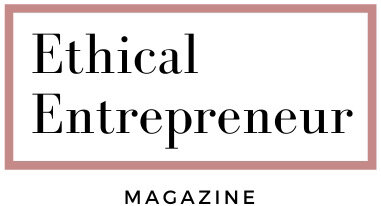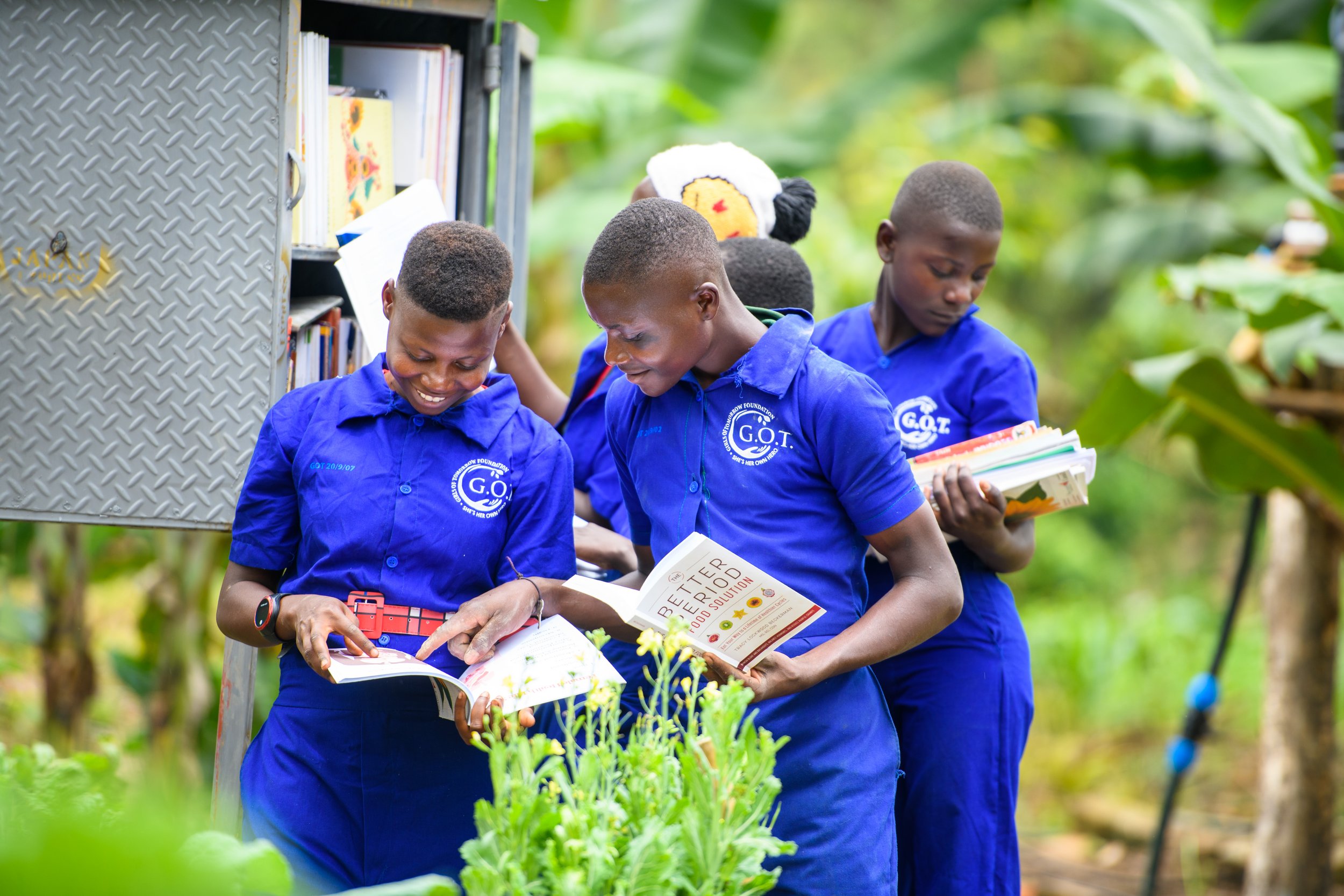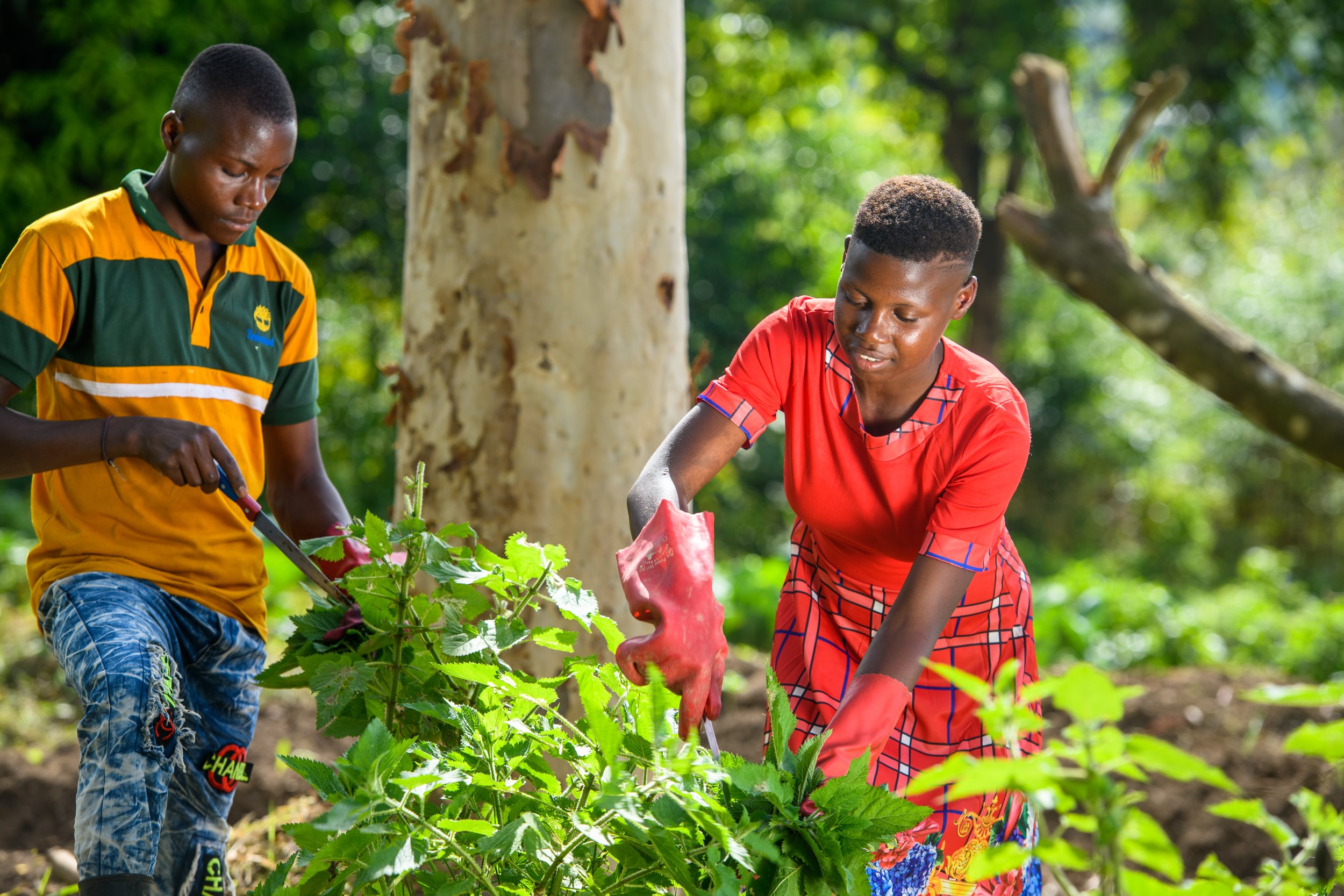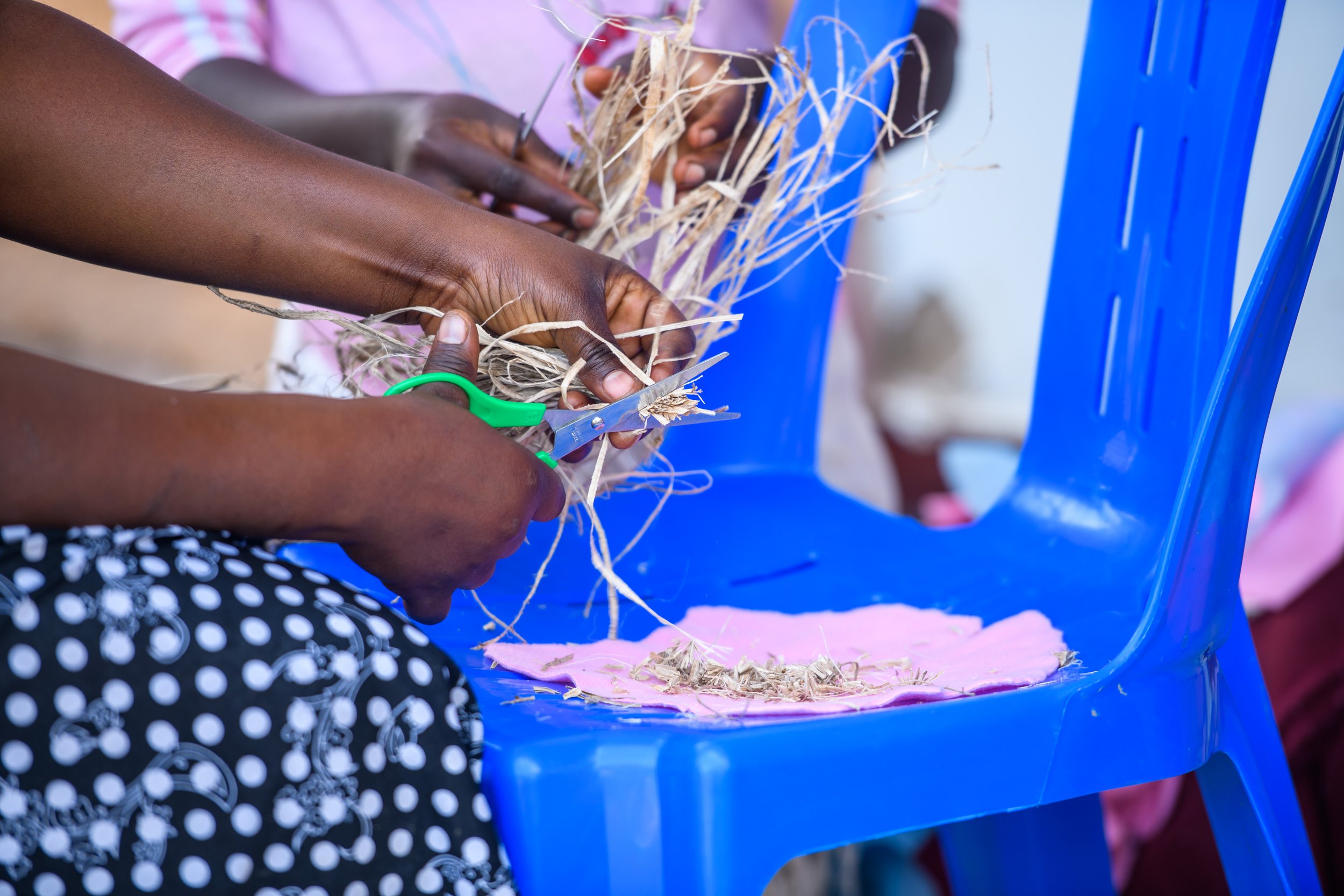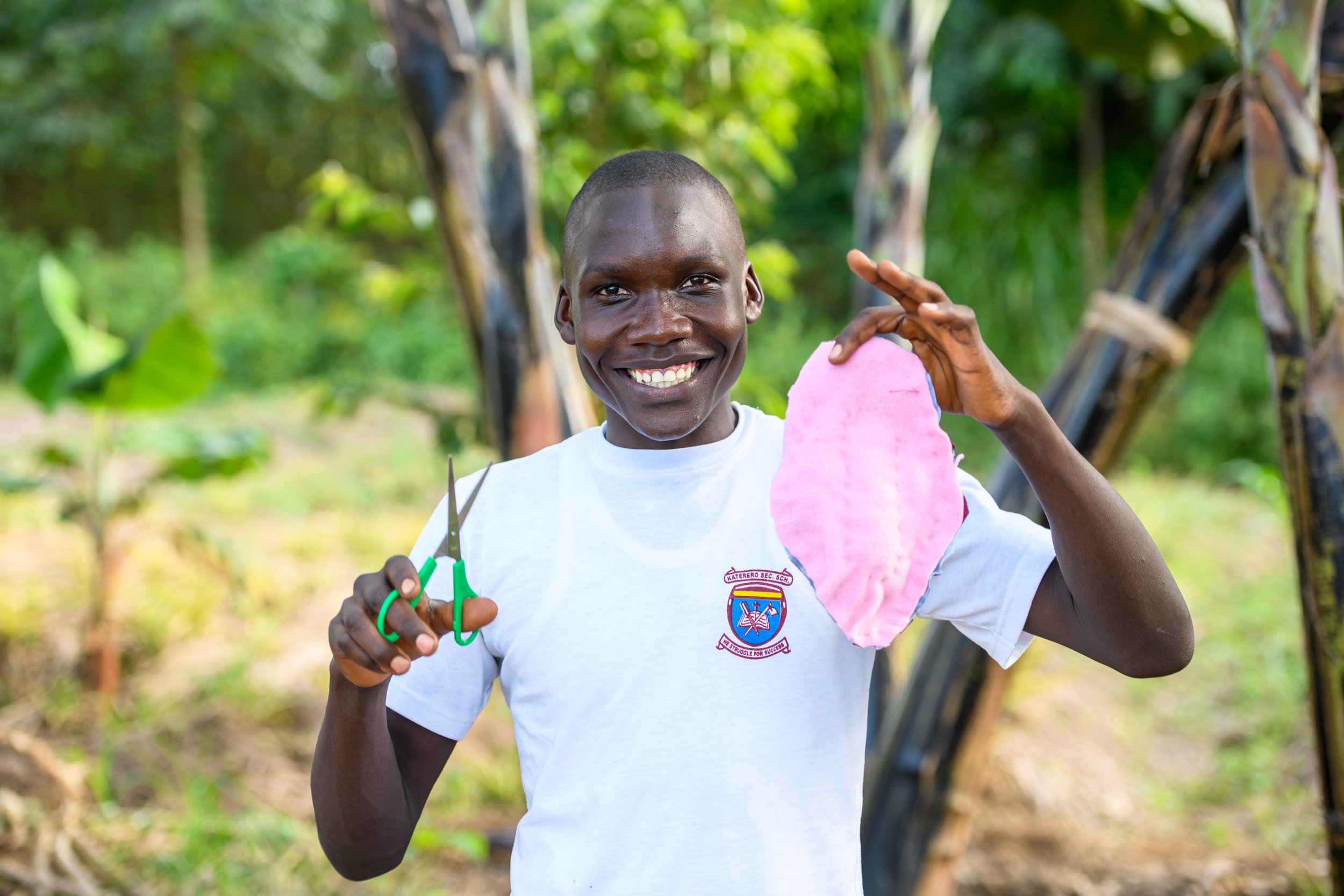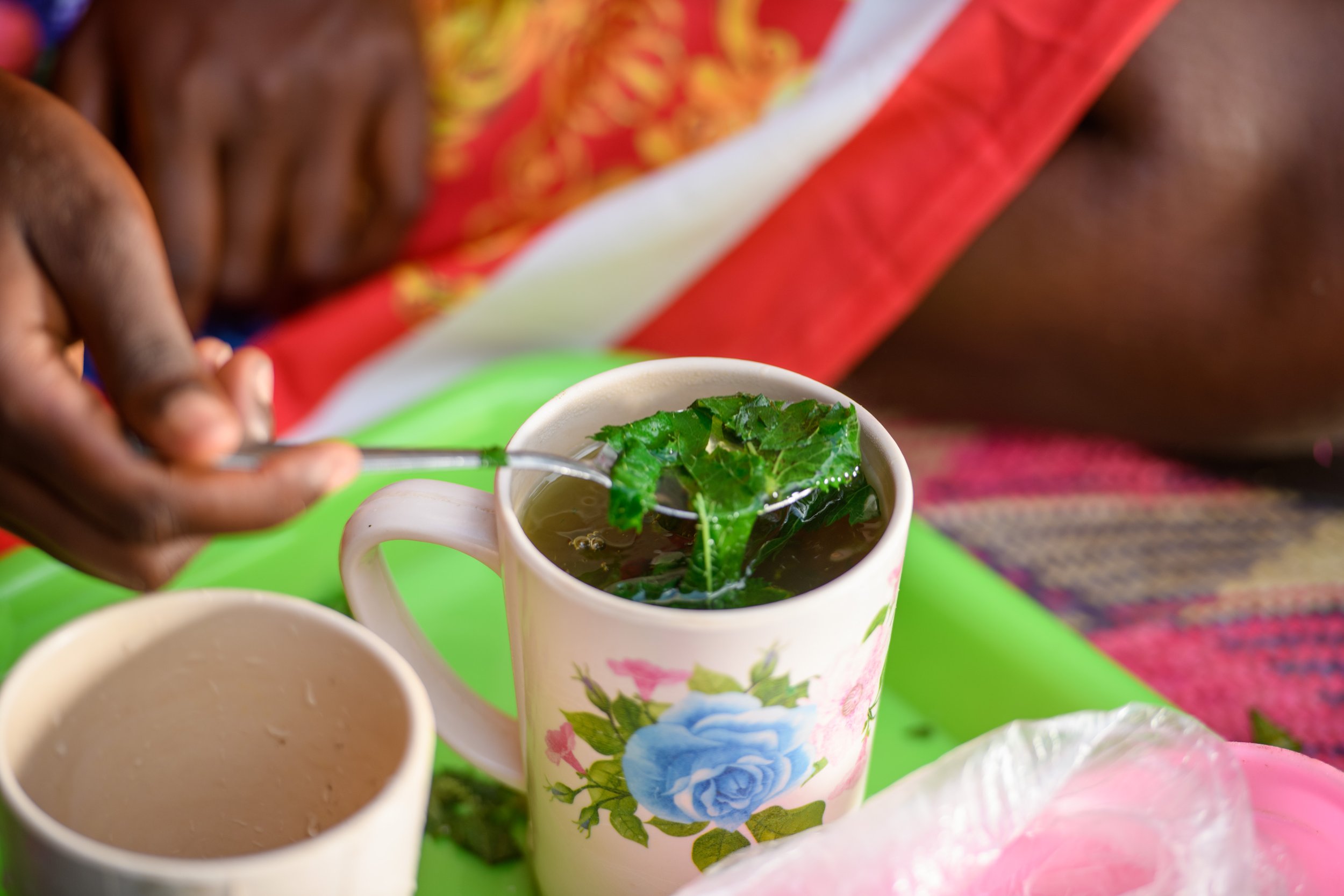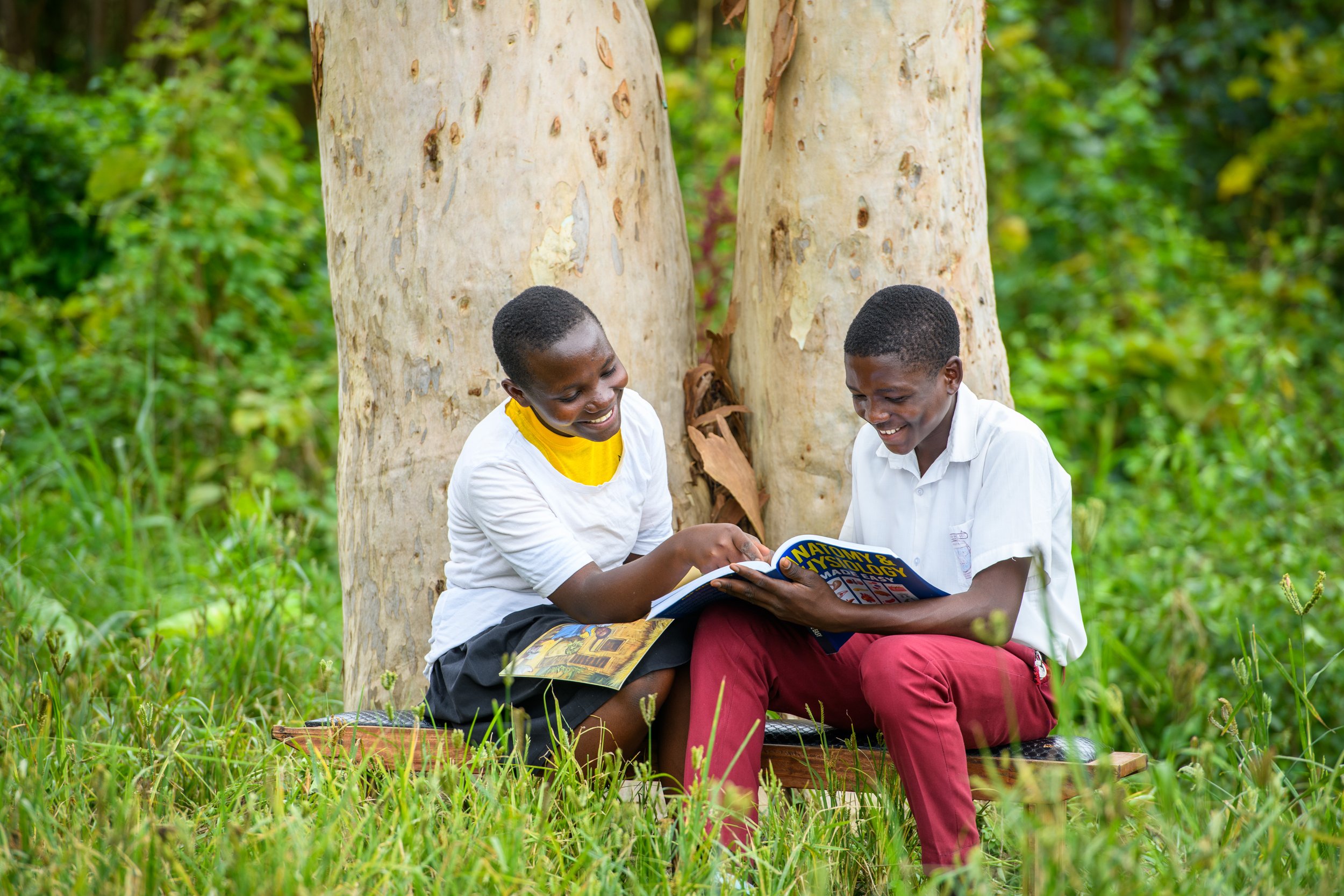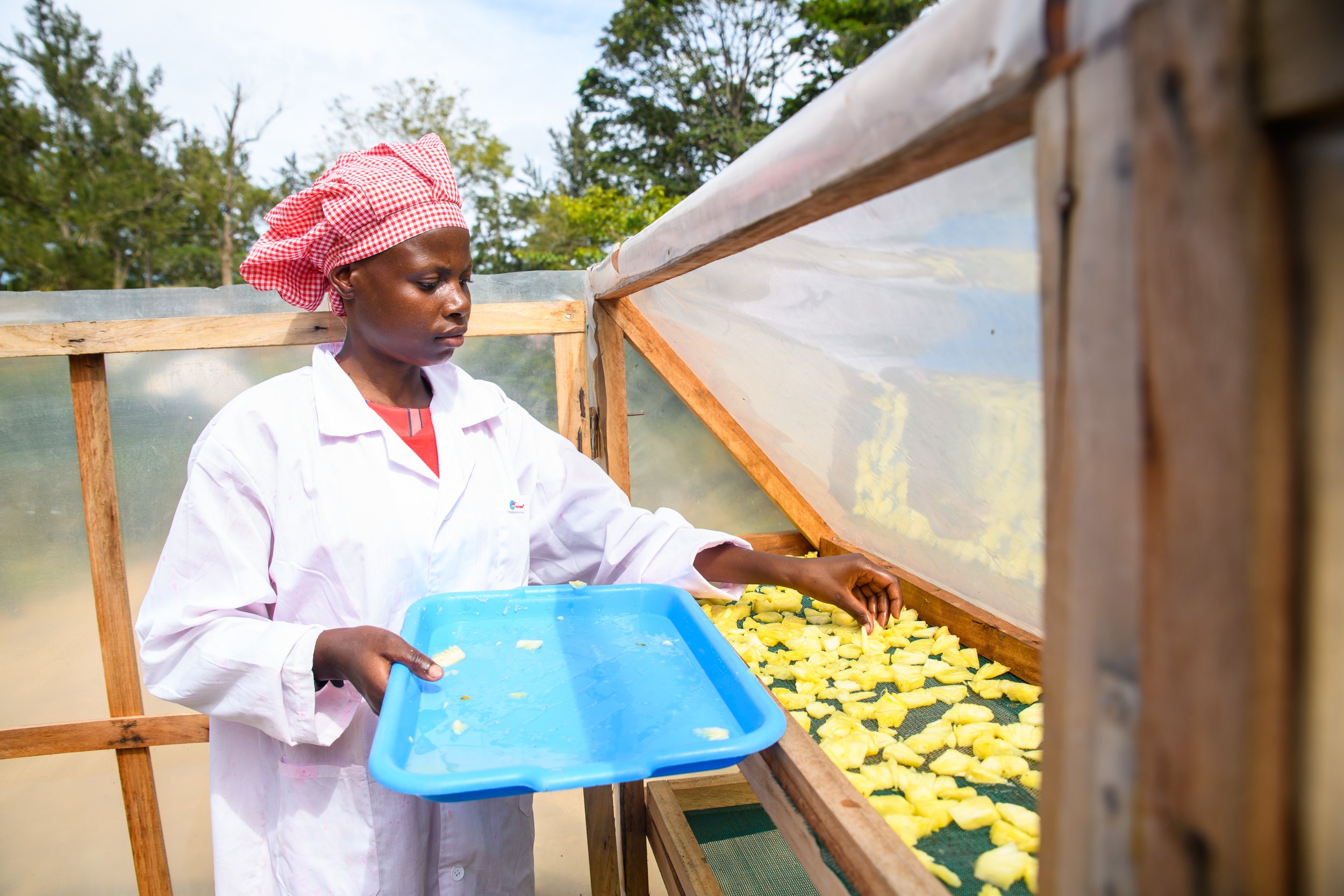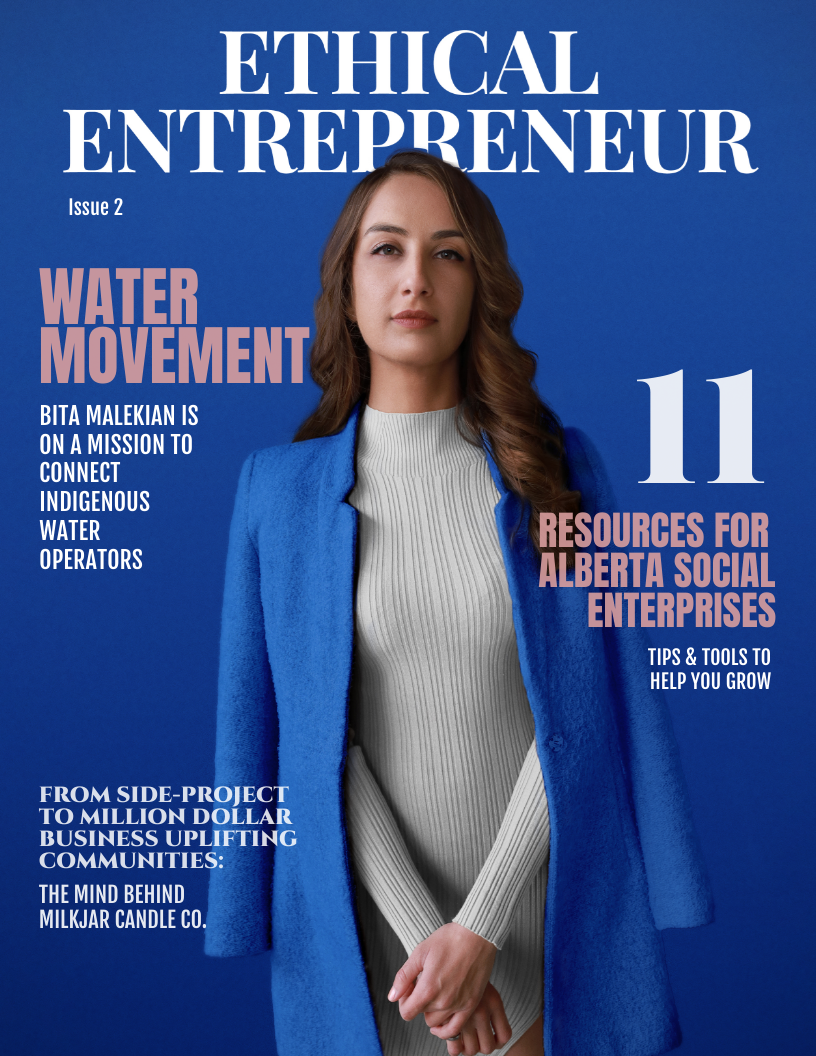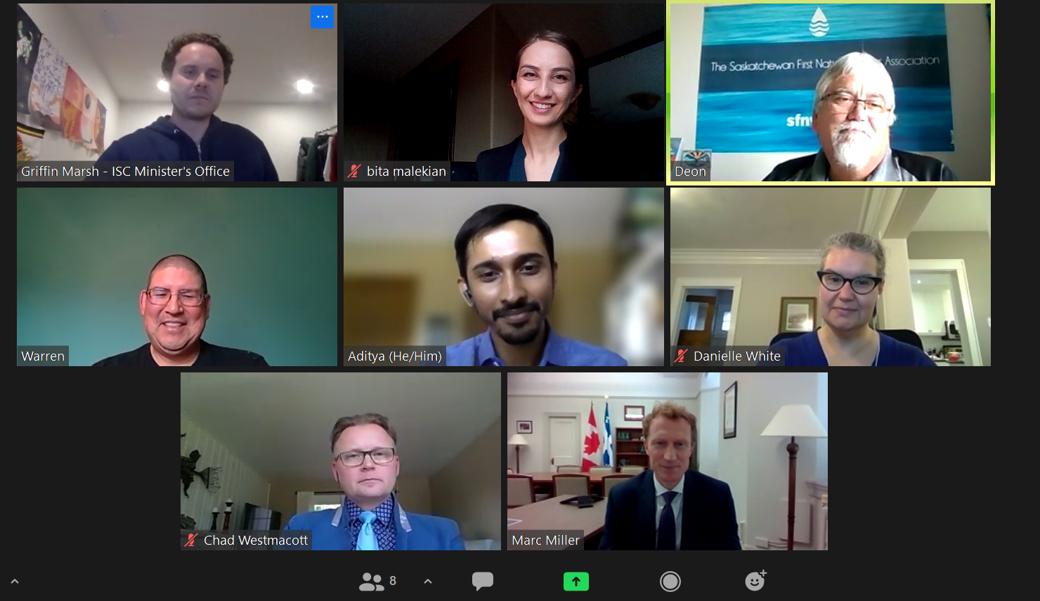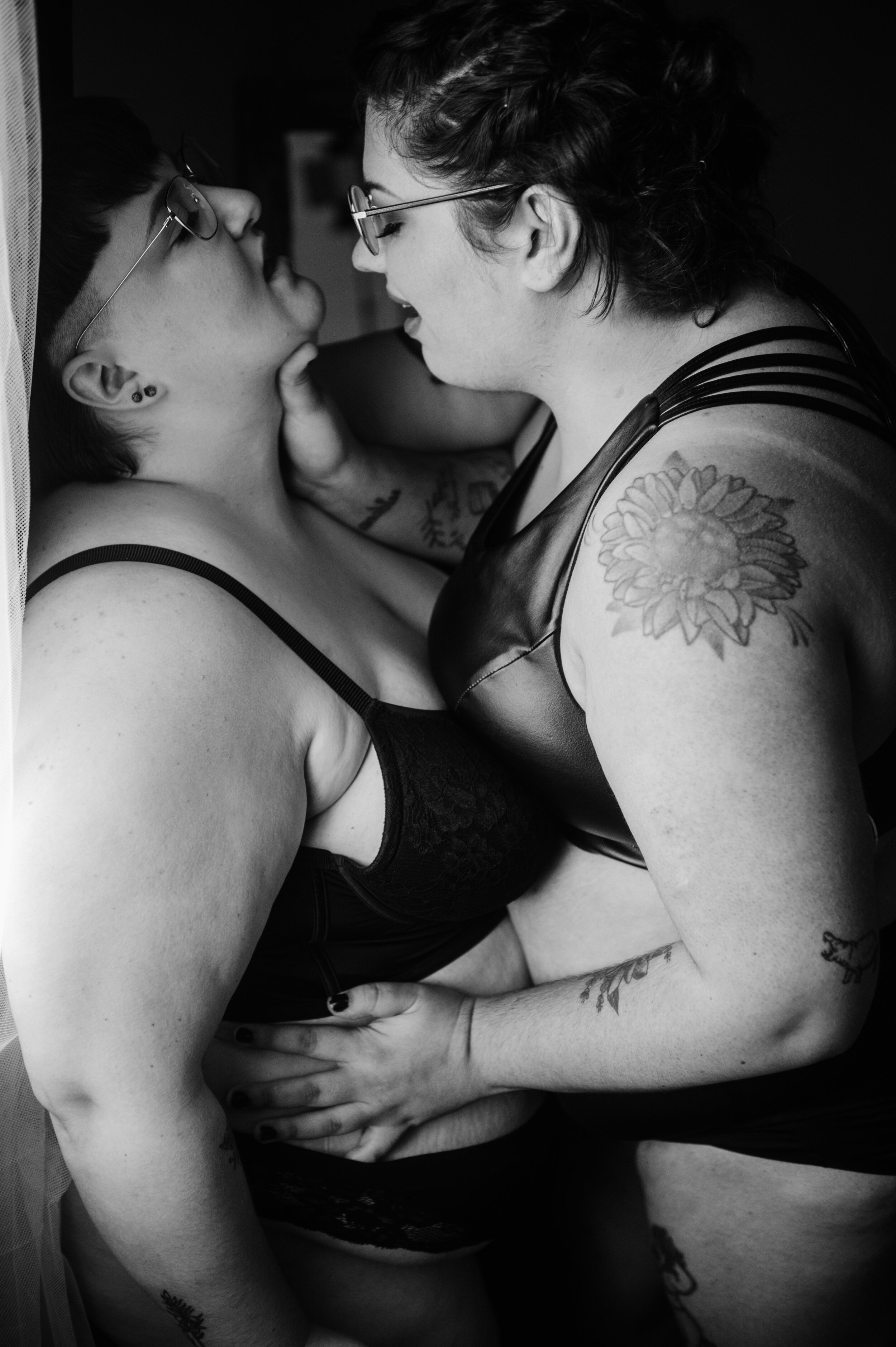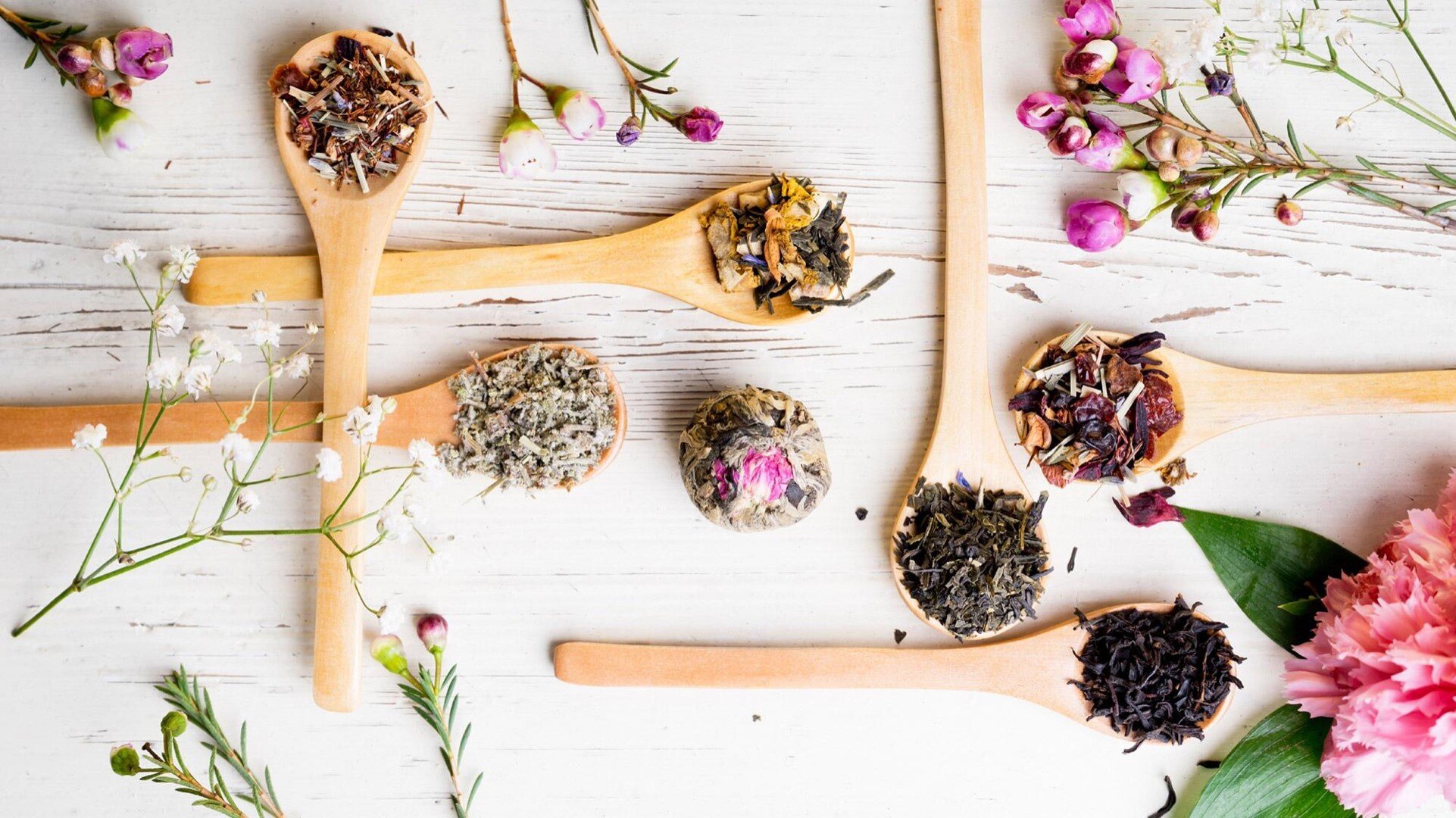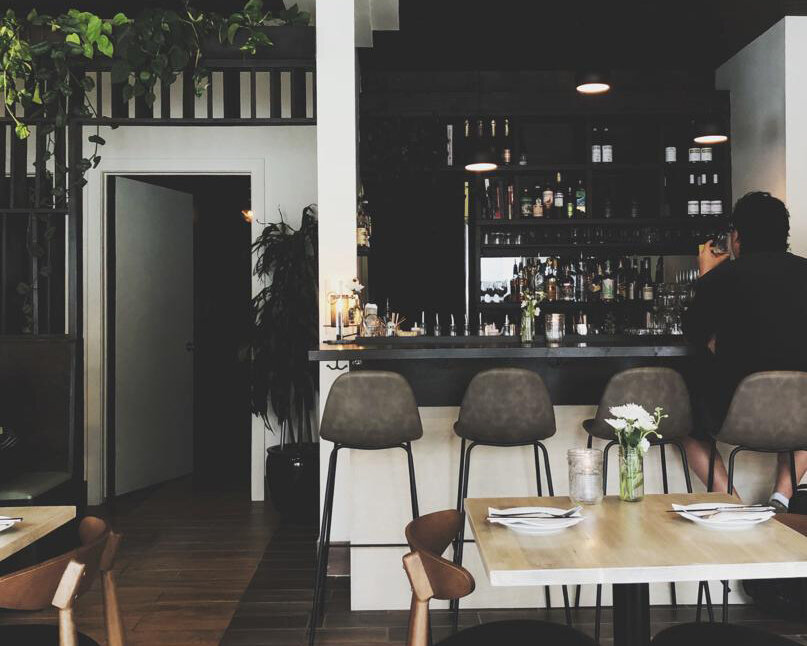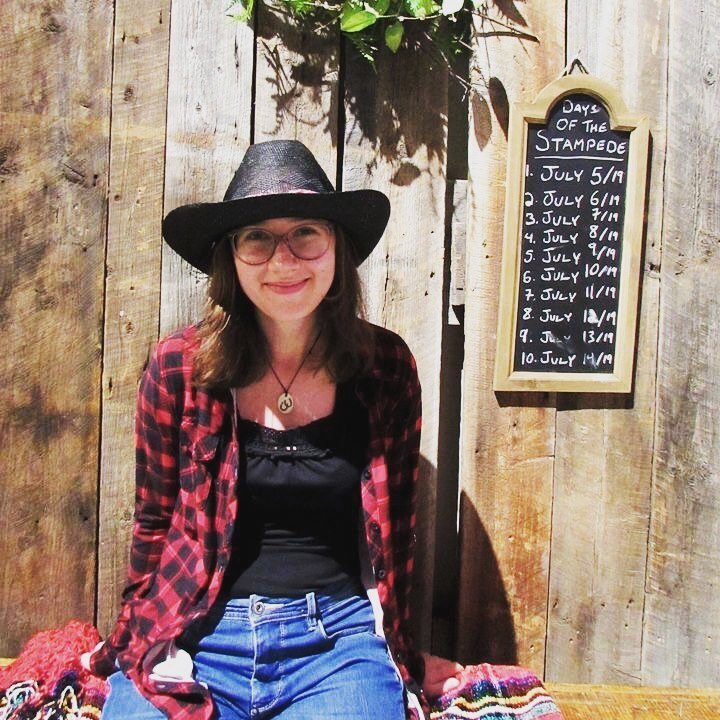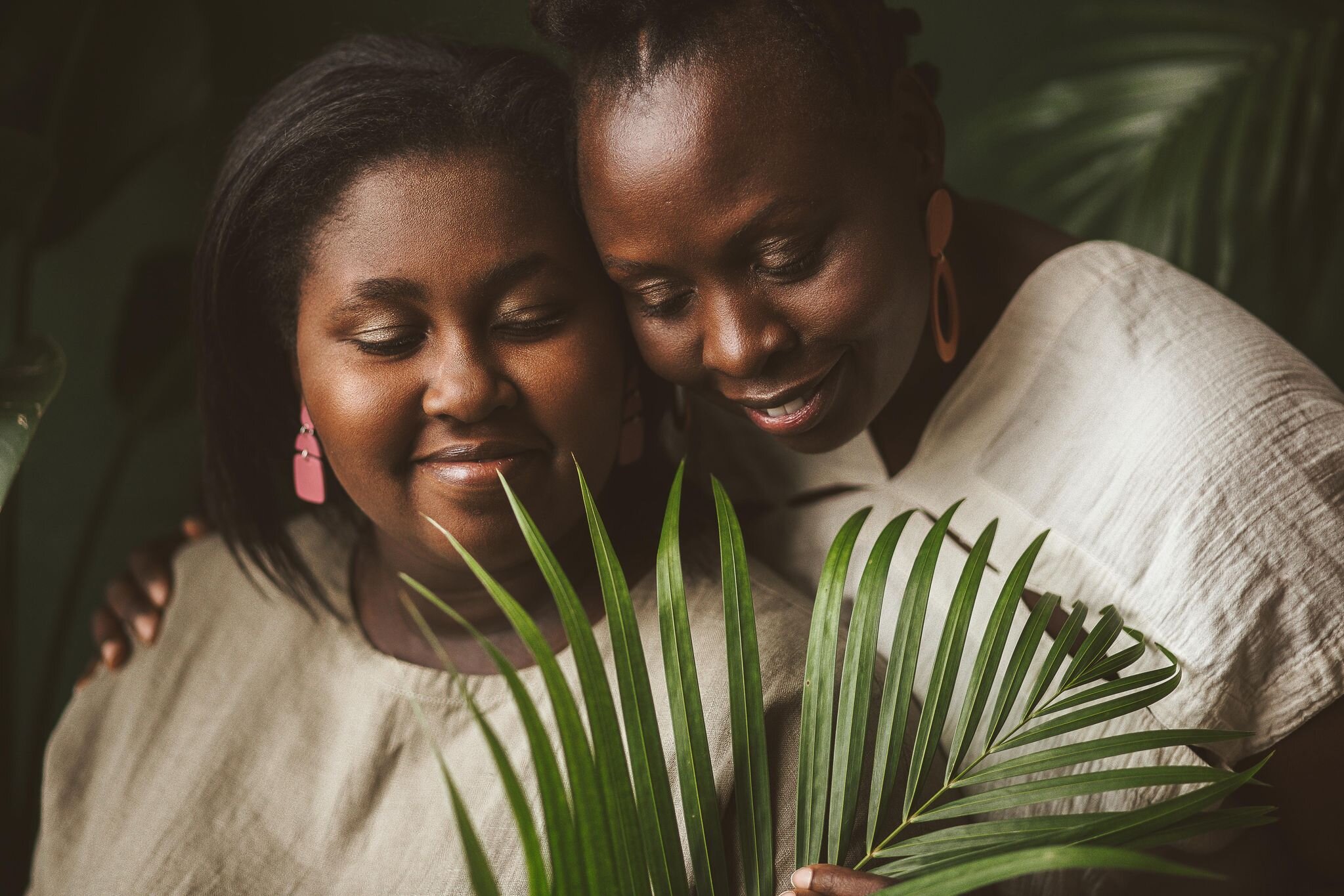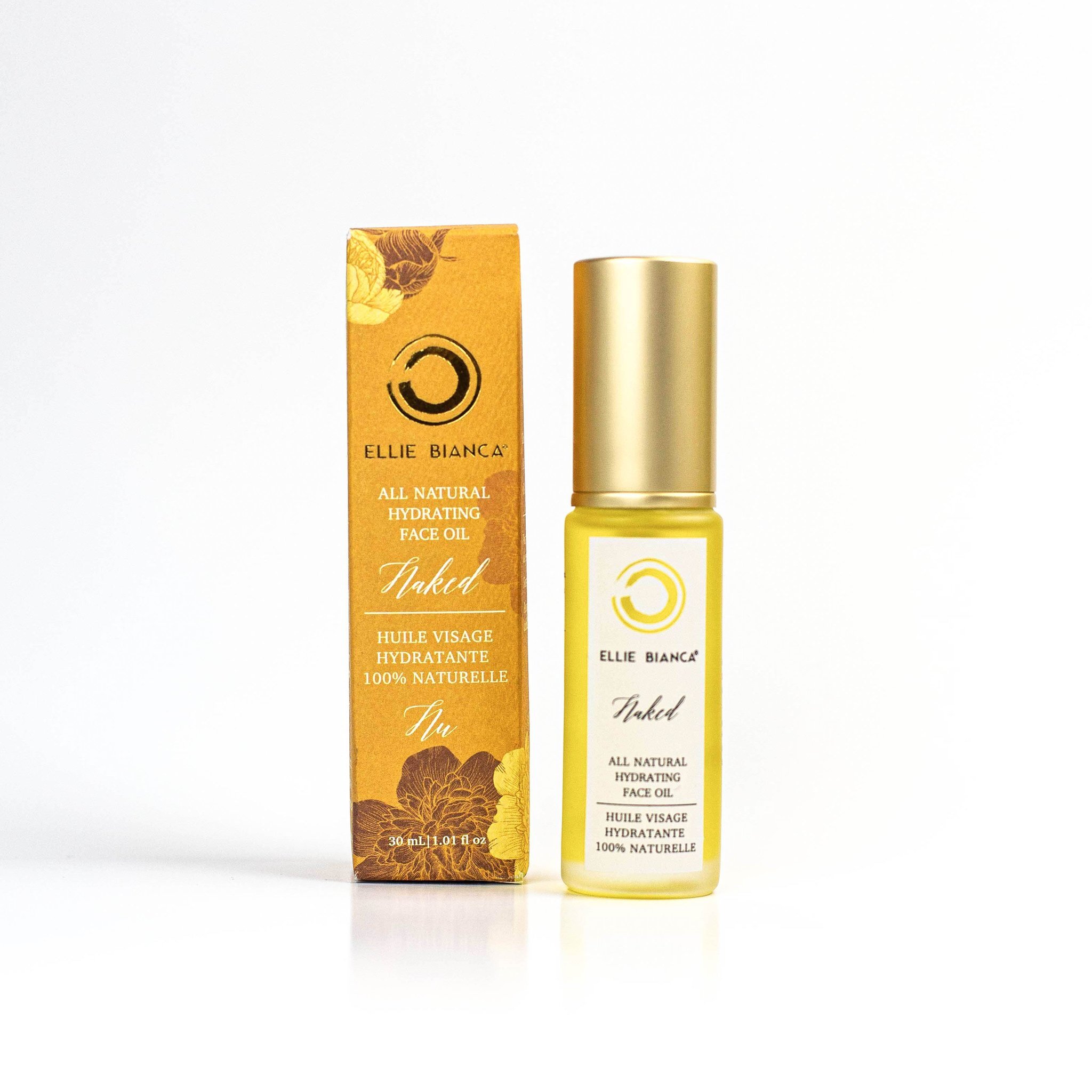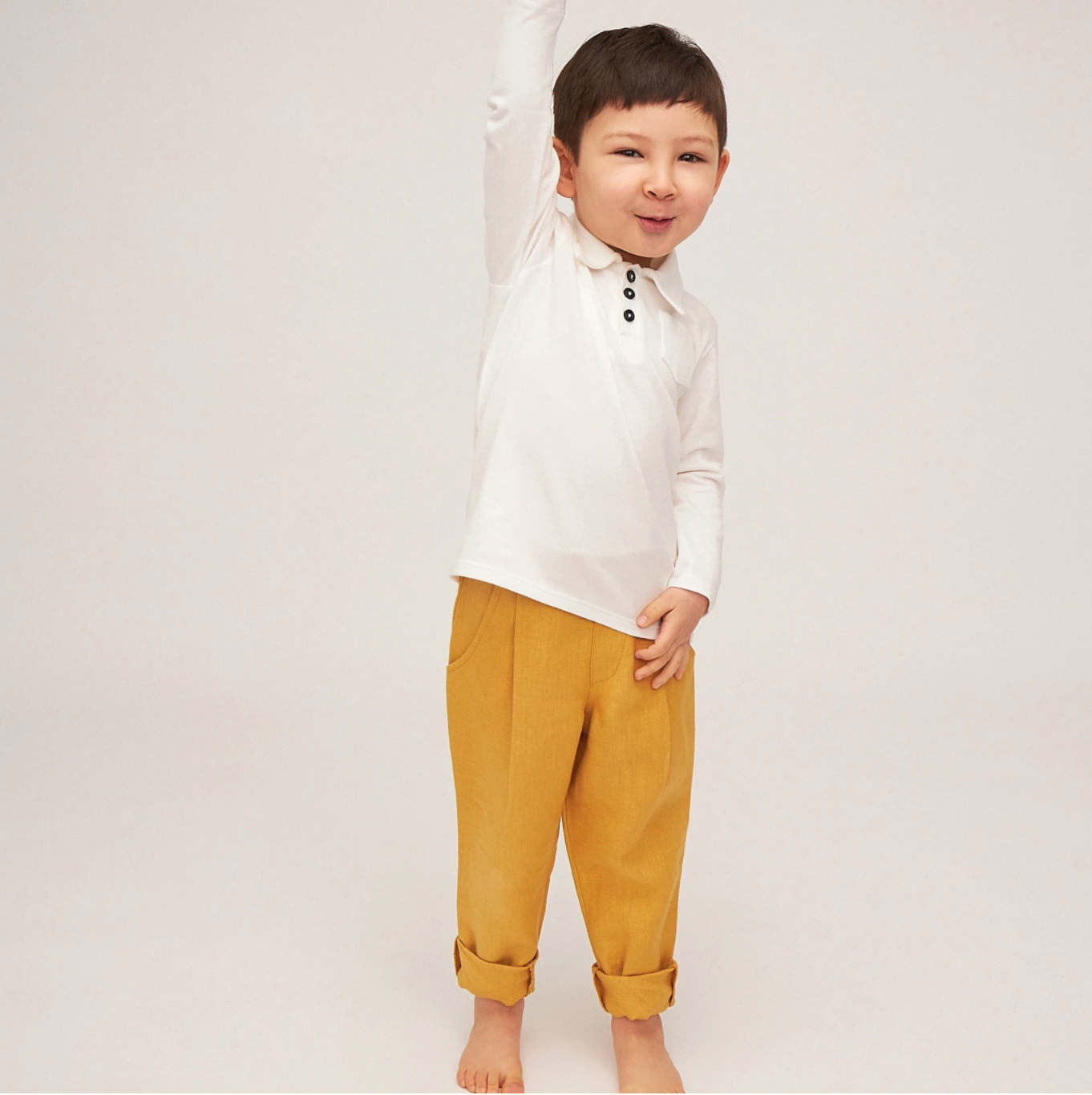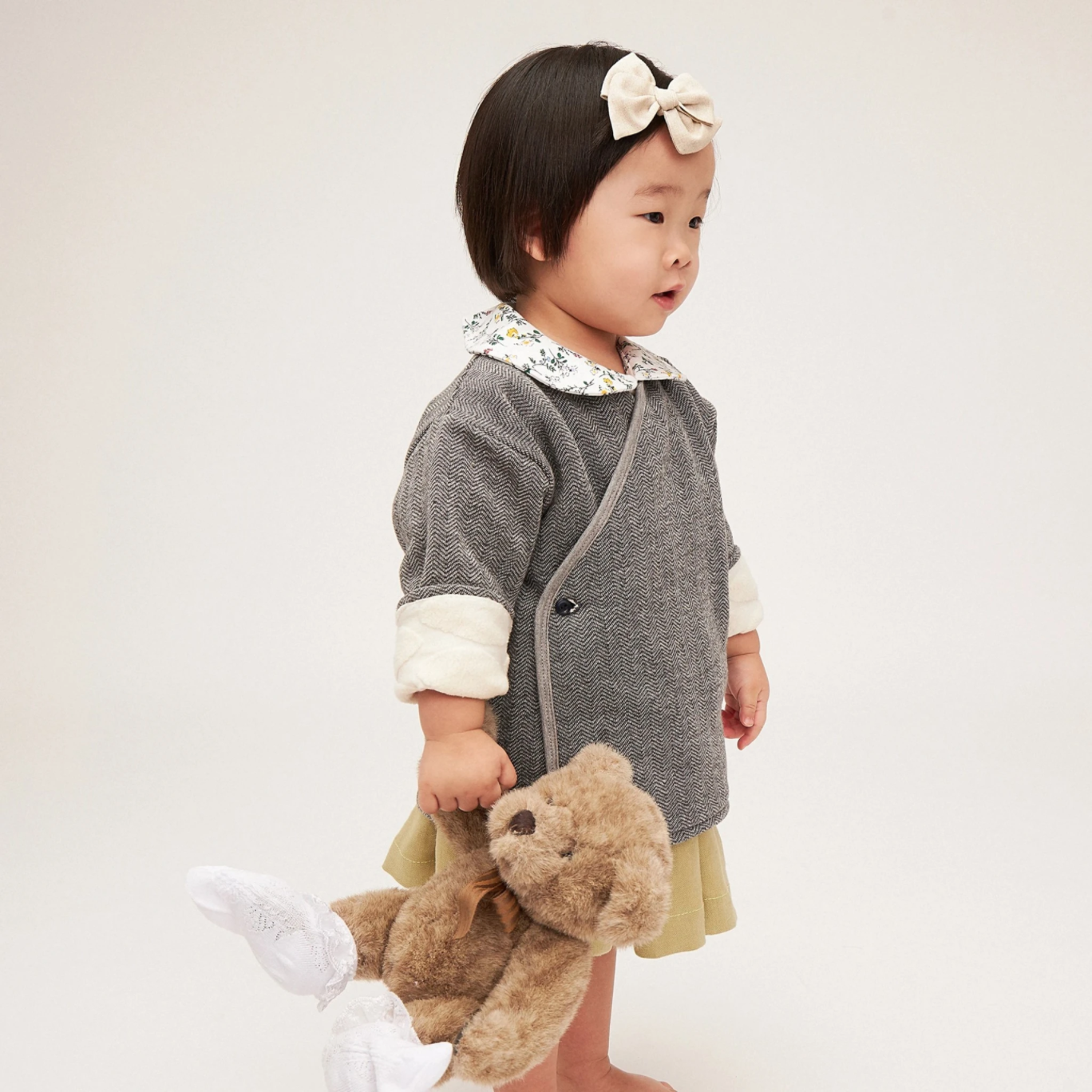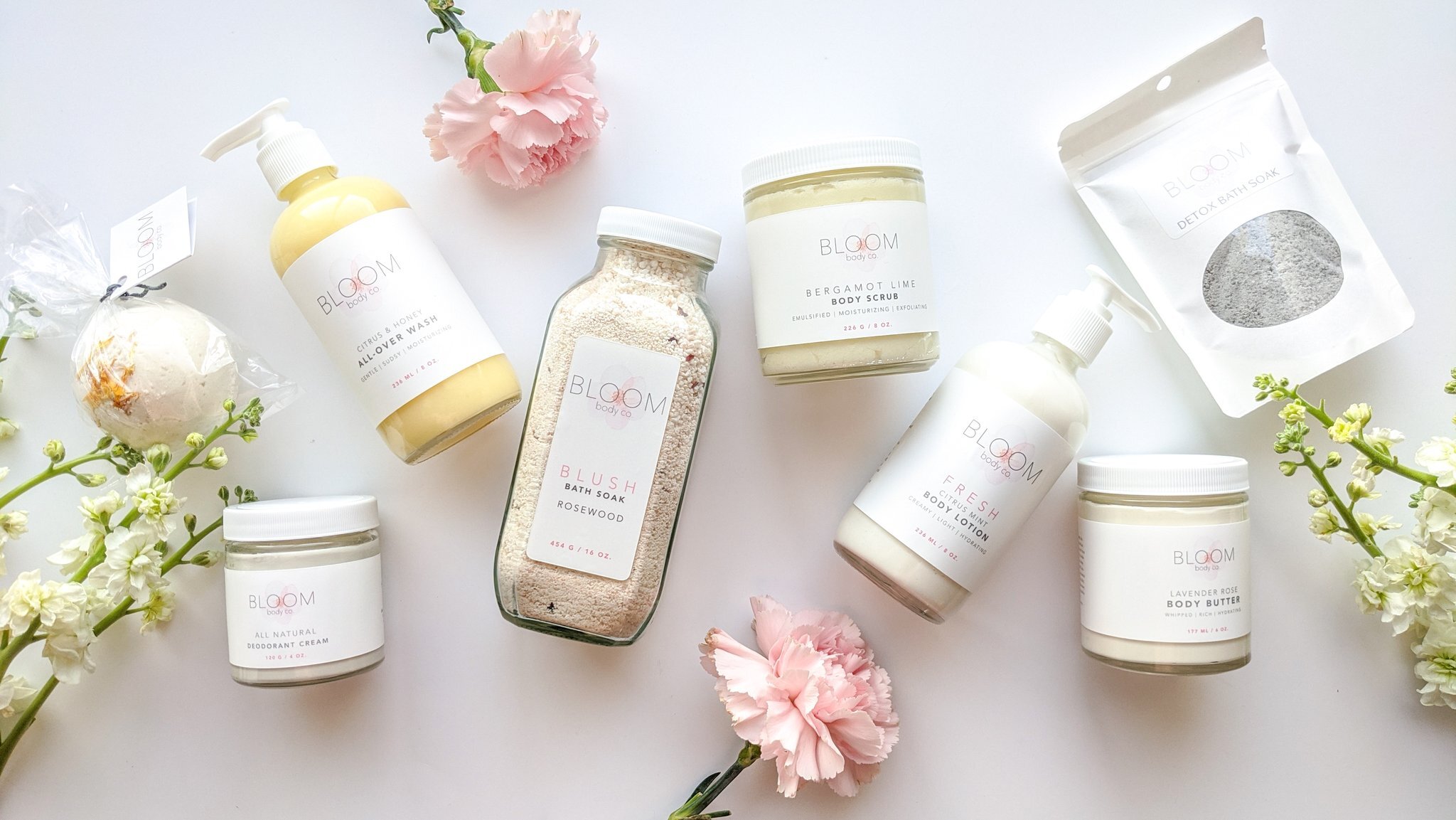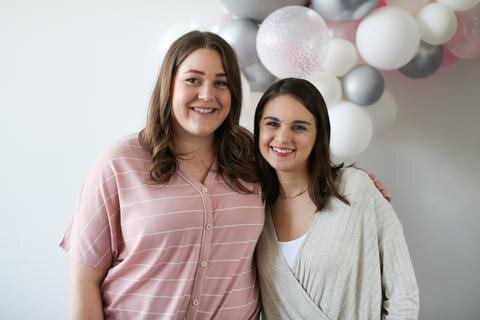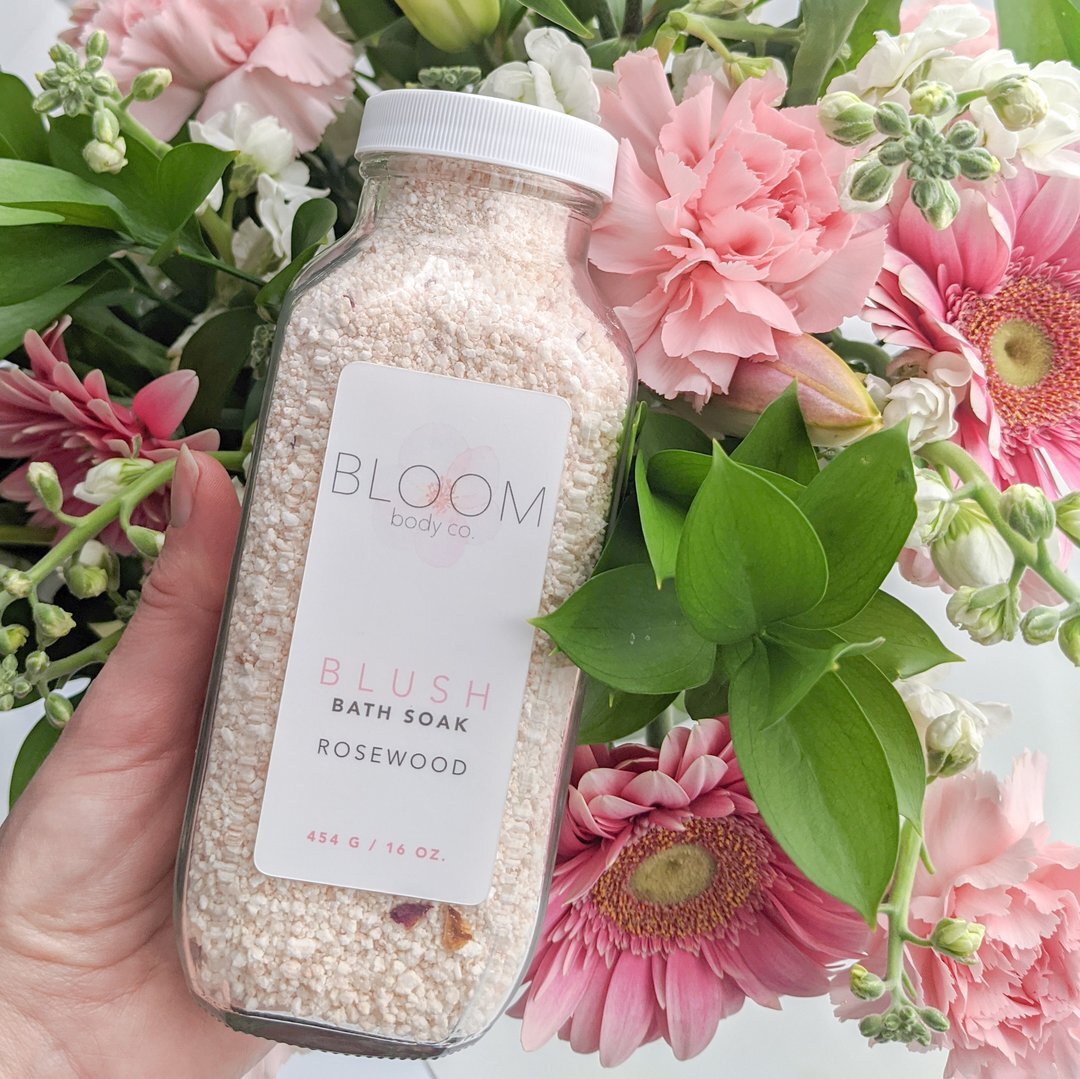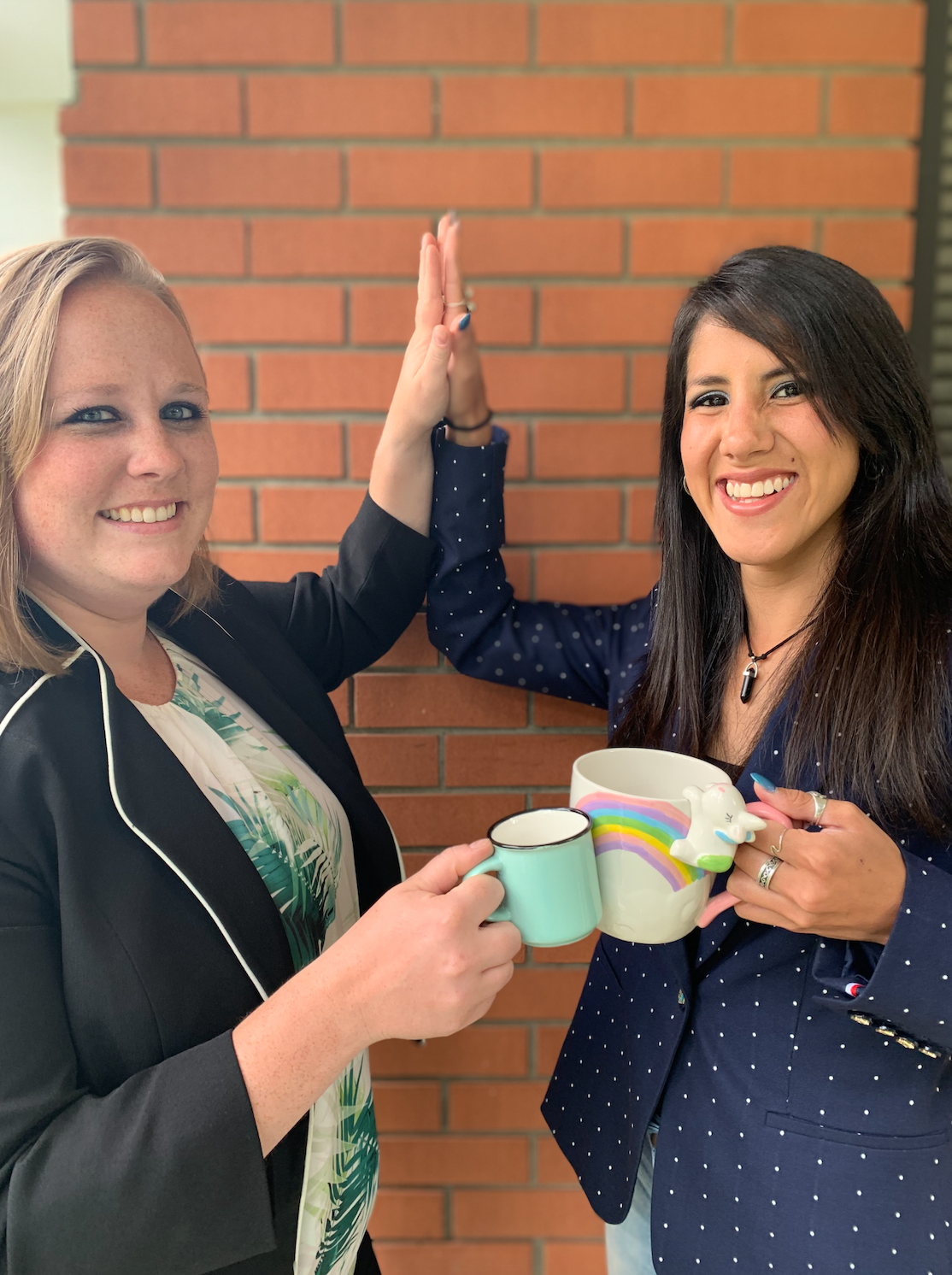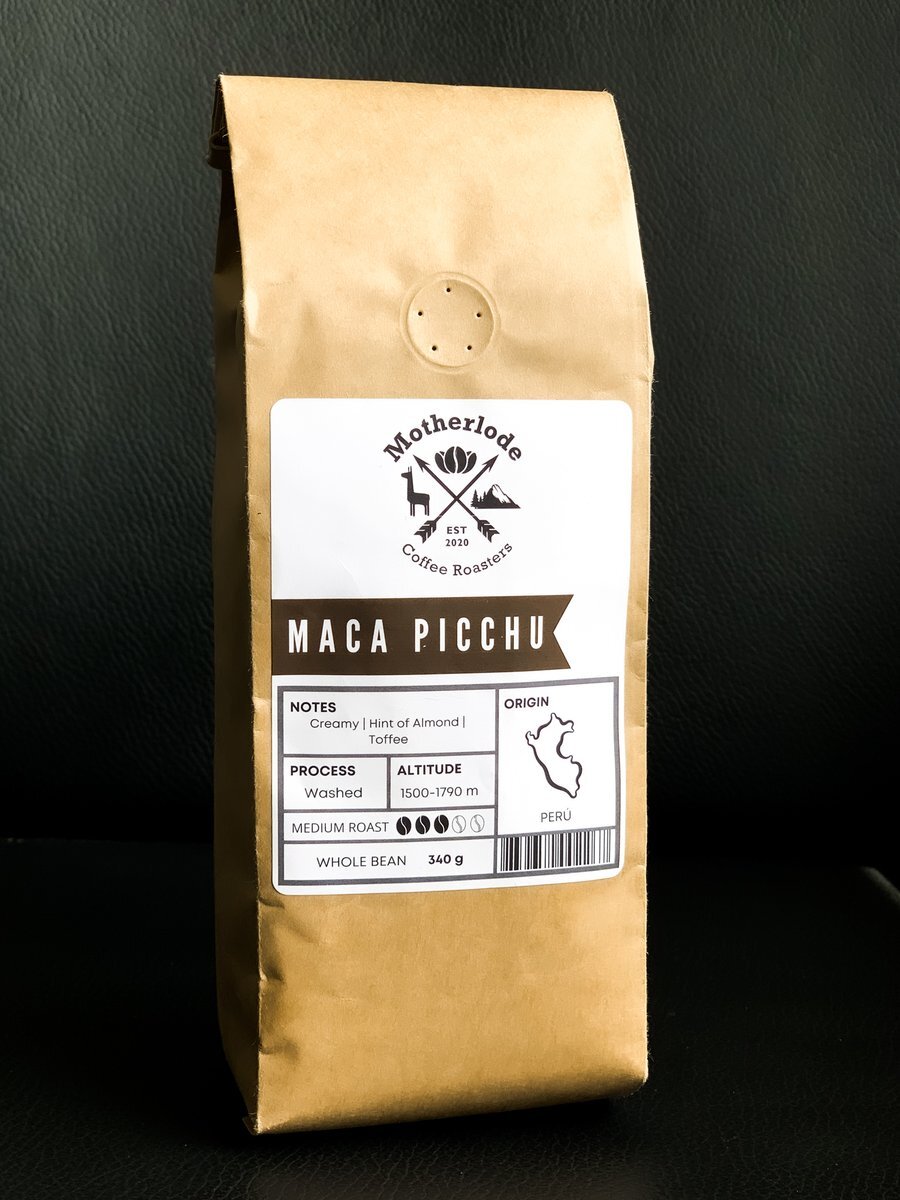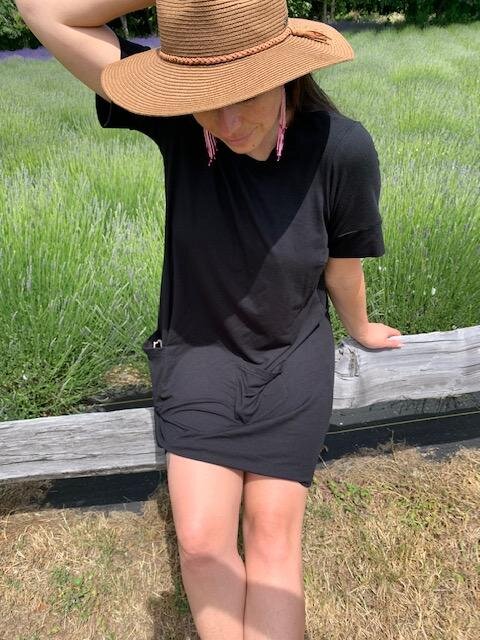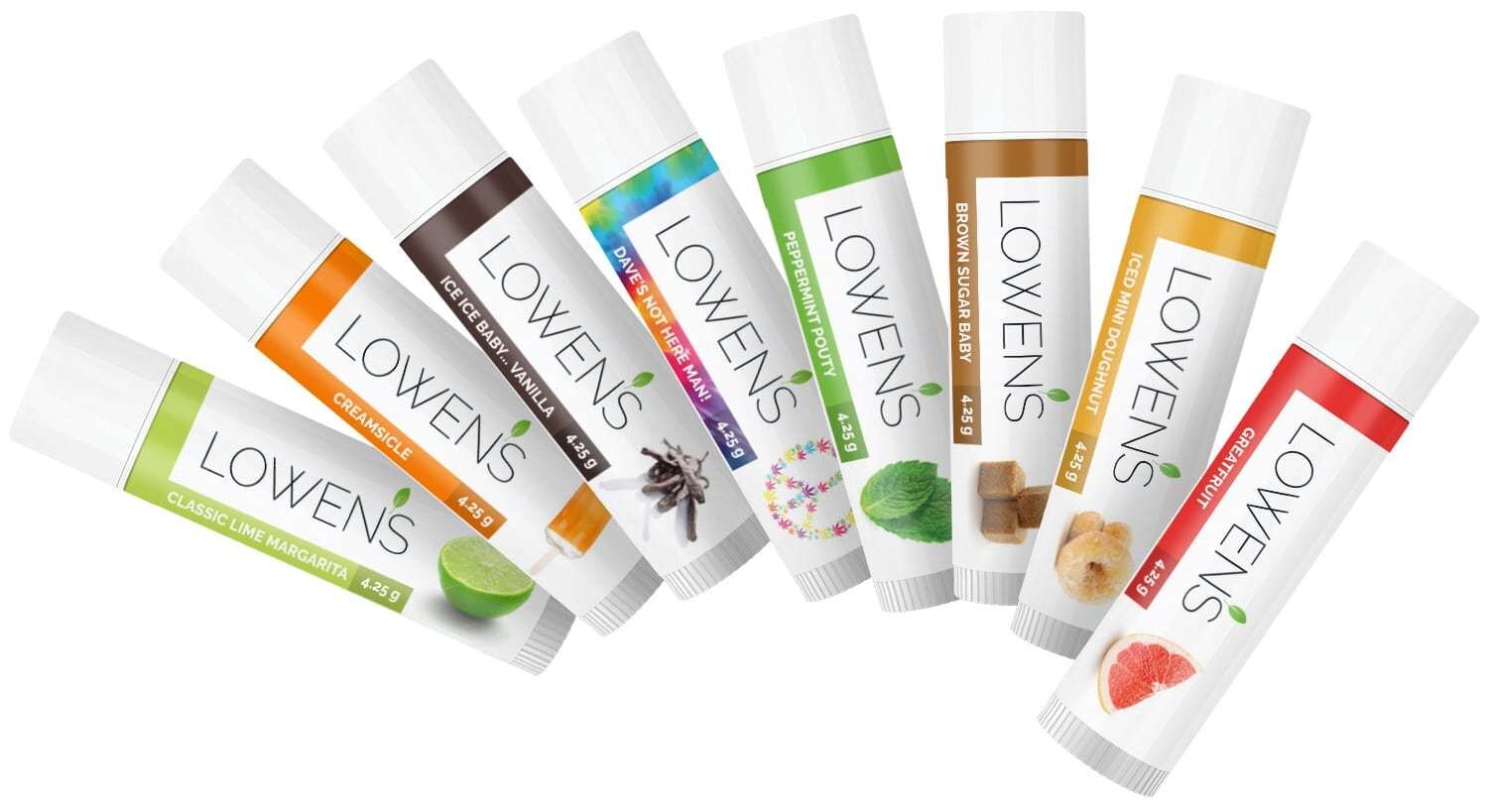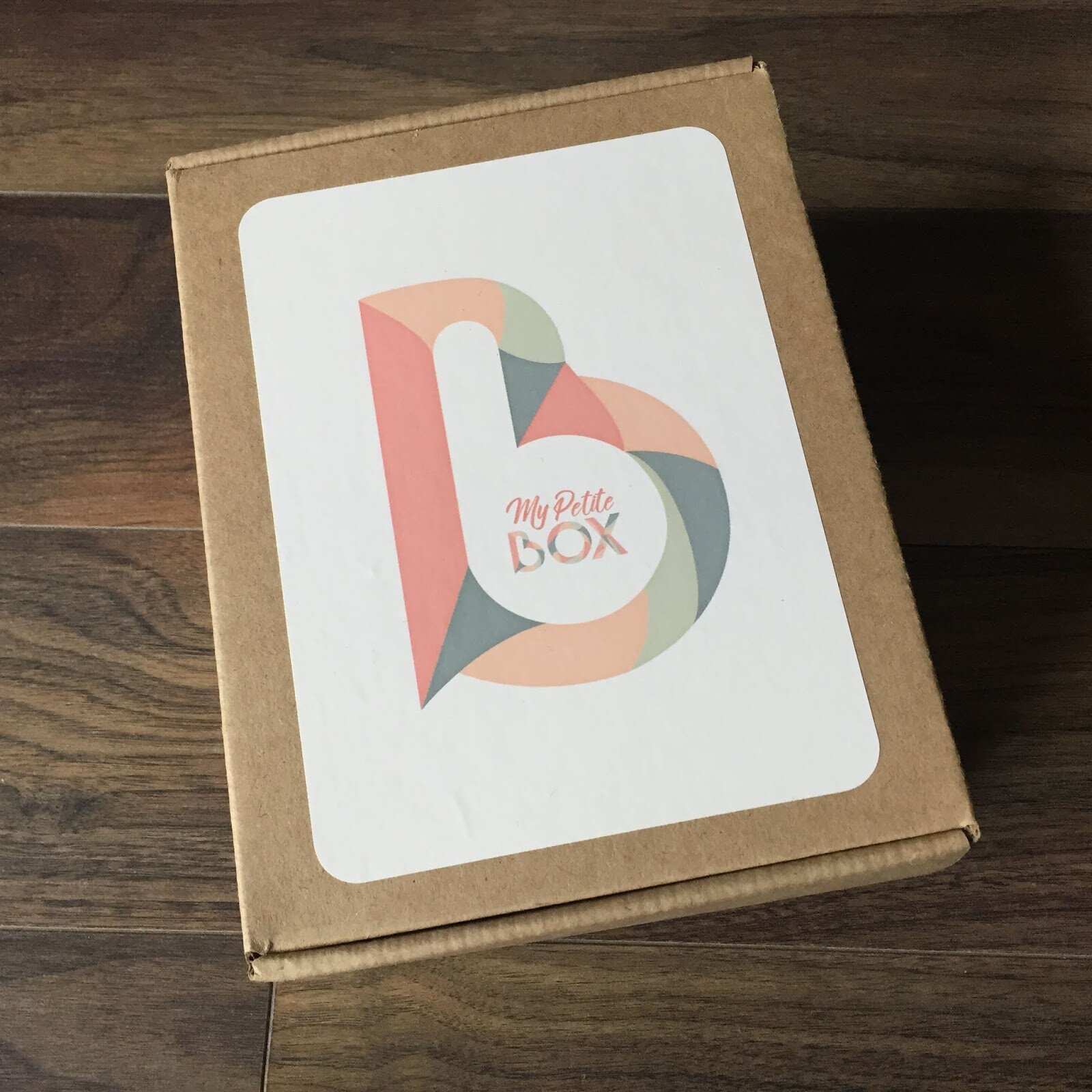Empowered through Plants: How Permaculture Gardens are Combatting Menstrual Stigma in Uganda
Male and female students learn how to plant gardens that support female health
In Uganda, menstrual stigma persists as a pervasive issue affecting the lives of countless women and girls. Shockingly, a recent national study revealed that over 60% of Ugandan girls face exclusion, shame, and ridicule due to their menstrual cycles. Cultural norms, inadequate access to menstrual hygiene resources, and limited education on the subject contribute to the perpetuation of this stigma. This has had devastating consequences for girls’ school attendance rates, mental health and sport participation rates.
Often, complex social problems require unique solutions. In late 2022 Canadian charity, Girls of Tomorrow Foundation, embarked on an innovative project in partnership with five Ugandan schools and a community center, aiming to revolutionize menstrual health education. With a grant from Global Affairs Canada, this 11-month initiative sought to empower young girls through the creation of female-centered permaculture gardens, ultimately challenging and dismantling menstrual stigma.
“[They taught] us how to incorporate nutrition during menstruation. We learned how to make different foods, fruits and vegetables, to support the menstrual cycle and I know students can do it even if they’re at home and their diet will improve and their health will improve.” —Male Teacher
During the project, boys and girls learned how to create permaculture gardens at their schools. What made the program unique, however, is that in the process students also learned how every plant was connected to female health and well-being. For example, students learned the millet could be consumed by menstruating girls to raise their iron levels. They also learned how to use banana fibres to make reusable menstrual pads.
“We grew up using a banana stalk at home for mulching our garden and sometimes they just threw it away. I never knew that it could be of help to me during my menstruation…They taught us how to use a banana fiber to make menstrual pads and I was surprised because the pads are comfortable, washable and dry very fast. I shared this knowledge with my parents who later asked me to make a sample for them. They were also surprised at such an innovation.” —Female Student
The project's core objectives were clear: utilize permaculture education to increase support for girls' menstrual health and hygiene, boost girls’ self-esteem, and increase girls’ school attendance. Over the course of this transformative period, the results have been nothing short of extraordinary.
One of the most remarkable findings was the drastic reduction in absenteeism due to menstruation. At the project's outset, a staggering 66% of girls reported missing school at least once a month due to their period. However, after the 11-month period, this percentage reduced to 18%.
Not only have these gardens provided a sustainable source of nourishment and learning, but they have also fostered an environment of open dialogue surrounding menstrual health. Through workshops and discussions, girls gained a deeper understanding of their bodies, eroding the walls of stigma and misinformation.
“Boys attitudes on the myths related to menstruation have started changing because they now know that is normal to be in menstruation, and they no longer chase us away because of our period”—Female Student
“Before boys were seeing themselves as being superior to girls but in this project we were all taken to be at the same level” — Female Student
The Girls of Tomorrow Foundation hopes that their lessons can be replicated in other parts of the world, adapted with plants relevant to those contexts. It’s an opportunity for other communities to plant the seeds of change, tear down taboos, and empower the next generation of women.
For more information about Girls of Tomorrow Foundation and their projects, visit girlsoftomorrow.ca. The Girls of Tomorrow thanks Global Affairs Canada, Manitoba Council for International Cooperation (MCIC) and The Fund for Innovation and Transformation (FIT) for funding this project.
COVER FEATURE: Bita Malekian of Water Movement
“I’m not just inspired [to take action], I’m outraged."
Written by Dawn McDevitt
Canada has 20% of the world's water and less than 1% of the world's people.
Most of us turn on the tap and out comes clean water. With such abundance, why are we failing the United Nations’ Sustainable Development Goal 6: ‘Clean Water and Sanitation for All’? In many Indigenous communities, water must be boiled to be safe. In some, even boiled water is unsafe to drink.
Bita Malekian, a Calgary-based engineer, has been making waves. “I’m not just inspired [to take action], I’m outraged and I won’t stop until every Indigenous community in Canada has their dignity restored, because no one should be without a vital essence of life,” asserts Malekian.
As a member of Calgary’s professional chapter of Engineers Without Borders, Malekian learned from Indigenous water facility operators about their lack of opportunities to connect and collaborate with each other. She recognized that an online platform could help bridge the gap. Since then she has been actively supporting Indigenous leadership and solutions to Canada's water crisis.
After listening and learning for three years, Malekian launched Water Movement in January 2021. It grew quickly to over 2,100 active users posting issues and sharing advice. Collaboration continues to shape Water Movement, keeping the focus on the people it serves. “First and foremost, we are guided by an all Indigenous board of directors...and we are continuously adapting to the needs of the operators,” says Malekian.
Malekian, who made the 2021 list of the Top 30 Under 30 by the Alberta Council for Global Cooperation, redirects attention away from herself. She credits the work of the board and volunteers – called Ambassadors – for making Water Movement a true movement. What began as an online platform became a way for water operators in different communities to form a body of knowledge and influence. By May 2021, Malekian and Water Movement gained enough momentum to secure a meeting with Indigenous Services Canada (ISC) Minister Marc Miller. Malekian and Water Movement Directors Warren Brown of Lytton First Nation, and Deon Hassler of Carry the Kettle Nakoda Nation, presented specific calls to action.
Malekian looks at her choice to enter the field of engineering as a way to make a meaningful impact locally and globally. To solve society’s most complex issues will take everyone working together and “engineers play a critical role,” notes Malekian. Her volunteer work with Engineers Without Borders showed her what strong leadership looks like and enabled her to develop skills and knowledge “not just as an engineer, but as a global citizen.”
On the way to launching Water Movement, Malekian acknowledges having to step back and change her approach to problem-solving. In order to build trust and be an effective advocate, she realized she needed to first invest in building relationships. Connecting and understanding others on a human level was a must and it couldn’t be rushed. It also meant shifting typical industry practice of linear timelines and firm deadlines to a cyclical model of engaging operators and other stakeholders as a continuous process and inviting feedback at each step.
When asked what advice Malekian would give her younger self, she says “we learn about residential schools—political leaders apologize regularly— and it seems like it’s all a thing of the past…it’s not. But I’d also paint a picture of hope and progress…and about the silent heroes I’d meet, the Indigenous water treatment operators who will inspire me and show me the true power of community.”
“I do (this work) so my family and friends can have water”
Reflecting on Canada’s water crisis, Malekian sees attention focused on scholars and professionals tackling the issue, yet largely unseen are the people actually solving it – Indigenous water treatment operators. “They work silently and diligently, because if they stop to fight for the spotlight, their community might go under a water advisory,” notes Malekian. “When Warren Brown of Lytton First Nation was questioned about why he doesn’t leave his job for a much higher-paying position with a municipality, he simply replied, ‘I do it so my family and my friends can have water.’”
As Water Movement evolves, it keeps user needs at the forefront. A mobile app is in the works so that water operators can use the platform via smartphone or tablet including offline features “so operators in remote, low-bandwidth communities can still access it,” explains Malekian. Water Movement is also expanding learning resources on the platform’s Video Learning Library. Expert operators have been contributing to 100 new videos launching in early 2022.
A documentary film is in progress, to boost awareness of Canada’s water crisis, highlight the important work that everyday people are doing, and show that each of us has a part to play in tackling the problem. It’s being filmed by volunteer videographer Matt Miller and features current water leaders Warren Brown, Dr. Madjid Mohseni, Candace Cook, Dr. Michael Hart, and Disa Crow Chief.
“This is only the beginning…”
Other efforts to boost awareness include Water Movement’s participation in the 2021 “World’s Challenge Challenge” global finals, winning 3rd place among innovators from universities around the world. Malekian was also recognized with a 2021 sustainability award from the University of Calgary and a 2021 Women of Worth award from L'Oréal Paris. Support from celebrities hasn’t hurt either. Those shining some of their spotlight on Water Movement include Inuk throat singer Shina Novalinga, and Academy award winner Dame Helen Mirren.
“Water Movement is made possible through the joint efforts of volunteer Indigenous water treatment operators, videographers, editors, website developers, app developers, engineers, and students,” Malekian explains. “The tireless work of everyone involved has led to every success the organization has achieved...and this is only the beginning.”
Water Movement partner Aditya Chaudhuri is among the highly committed contributors. “I’m incredibly honoured...because we’re finally spotlighting, empowering, and supporting those who are solving the issue, instead of the leaders spewing out empty promises,” asserts Chaudhuri. “This long-standing water crisis must be addressed on the path to reconciliation,” adds Malekian’s sister and Water Movement ambassador Anita Malekian.
Undercurrents in Canada’s Water Crisis
On First Nations reserves, chiefs, and councils are accountable to members for services, including water, but the Indian Act limits their power to govern. The federal government still has jurisdiction over many aspects of life on reserves via colonial-era laws.
Regulations on safe drinking water don't extend to First Nations reserves. As a result, water management systems have been constructed without the standards and protections afforded all other Canadians.
Indigenous Services Canada (ISC) reports progress in ending over 100 long-term drinking water advisories. However, concerns about the government’s approach include chronic underestimating of costs, focusing on interim fixes rather than resolving root causes, and requiring use of contractors based on the lowest bid while failing to address complaints about project work quality and cost overruns.
“Indigenous Services Canada did not provide the support necessary to ensure that First Nations communities have ongoing access to safe drinking water.”
• Funding model from 1987
• Inadequate support for operations and maintenance
• No safe water regulations 15 years after recommendation”
Falling Short
In spring 2021, ISC committed to additional funding and to address the findings of the Auditor General’s report. Then in July, the federal government agreed to settle the national class action lawsuits on behalf of Tataskweyak Cree Nation (Manitoba), and Curve Lake and Neskantaga First Nation (Ontario). The suits alleged that Canada violated its obligation by failing to ensure clean water on reserves. The agreement includes $6 billion in previously announced funding, an additional $1.5 billion in compensation to those who have suffered lack of access to clean water, and a resolution method if the government fails to follow through.
Spending more money, though necessary, won't be enough to solve this multidimensional issue. Water treatment infrastructure and operations is an important component, as is protecting water at the source.
From a legal perspective it's worth noting that Canada has ratified several human rights treaties that include obligations around water and sanitation. Although Canada voted against the United Nations Declaration on the Rights of Indigenous Peoples (UNDRIP) which was adopted in 2007, it removed it’s objector status in 2016. UNDRIP recognizes Indigenous peoples’ right to determine and develop priorities for how their lands are used and to maintain and strengthen their spiritual relationship with traditionally owned or occupied lands, territories, waters, coastal seas, and other resources (United Nations). In June 2021 Bill C-15 became law. It requires that the government “take all measures necessary to ensure that the laws of Canada are consistent with [UNDRIP], and must prepare and implement an action plan to achieve the objectives of the Declaration.”
Indigenous-led initiatives to ensure safe water range from guardian programs to protect water at its source and community water-monitoring programs, to working collaboratively across regions, countries, and continents with indigenous communities experiencing similar issues. Indigenous-led organizations raising awareness and mobilizing support include well-known examples like Idle No More, lesser-known examples like the Nipiy committee, and emerging players like Indigenous Climate Action — founded by Alberta Indigenous women who saw a need to bring Indigenous Peoples together to begin discussions on climate change and Indigenous rights.
Recent developments reveal how innovative approaches can often bring meaningful changes. In February 2021, official personhood was legally granted to a river in Quebec —the Muteshekau Shipu (Magpie River). Protections include the right to be safe from pollution, maintain its integrity, and maintain its natural biodiversity. Its guardians are members of the Innu Council of Ekuanitshit. When it comes to water management, Canada’s first Indigenous-led water authority, Atlantic First Nations Water Authority is a potential model for others. It will serve as the utility provider for at least 13 of 33 First Nations in the region starting in 2022. The focus is sustainable services, and to achieve more funding collectively than member communities would on their own. Canada’s legal and economic structure treats natural entities like water, land, and forests as commodities to use for human benefit, with minimal caretaking to ensure their long-term health. As part of the journey toward reconciliation, water management in Canada must prioritize relationships with Indigenous peoples and consider Indigenous Knowledge as well as Western science. Indigenous women have long played an important role as water keepers and should have a place at the decision making table. Imagine if we applied to water, and water management, the holistic seven generations philosophy - that the decisions we make today should result in a sustainable world seven generations into the future.
See Bita’s feature in print in Issue 2 of Ethical Entrepreneur
Campfire Kinship: Unlocking the Power of Storytelling
By Mounira Chehade
Photo Credit: Shannon Hutchison at Beyond Our Image
In this increasingly complex world, what if stories held the key to our self-healing? Could stories stitch up our wounds so we could better serve ourselves and others?
Gayathri Shukla understands the life-changing power of stories and she is bringing a unique experience to fellow Calgarians who wish to tap into their own narratives. “I truly believe that when we can share our authentic stories, we start to celebrate what makes us unique, and we also celebrate our unity and diversity,” shares Gayathri.
Her social enterprise, Campfire Kinship, is honing the magic of storytelling to create transformation within individuals and the broader community. “Campfire Kinship offers story-based solutions to help people reclaim their unique stories, perspectives, and their authentic voices, while finding a sense of belonging with others,” explains Gayathri.
Gayathri is certified in Guided Autobiography, the method she employs to facilitate storytelling for those who participate in her workshops. “It is a structured method that helps people reflect on their life experiences through a set of themes as well as guided questions and prompts,” explains Gayathri. The process gives participants the opportunity to share their stories in small groups and develop skills like deep listening and ways to provide supportive feedback. “The beautiful thing is that, in the process, they end up appreciating others around them as well, and actually get to see the gifts that others bring through their diversity,” says Gayathri.
Gayathri’s own lived experience struggling to fit into her surroundings was the catalyst to exploring her own story. “I've felt the pain [of not fitting in], I've definitely lived the challenges of that pain. I had to pivot to figure out how to turn my pain into purpose. I needed to undergo my own transformation journey,” Gayathri shares. As a woman of colour and an engineer in a traditionally male dominated field, she came to understand that celebrating her own strengths and uniqueness would be of greater benefit to herself and others.
Through Campfire Kinship, Gayathri has seen that transformation process happen for others as they learn to delve into their own stories. “I've seen people that have come to my workshops feeling like there were so many parts of themselves that they were hiding, or they were ashamed of, because society told them not to be this way,” says Gayathri. Campfire Kinship helps people break free of harmful false narratives and gives them an avenue to reflect on their true path. Through this journey, participants are given the opportunity to reimagine their own mission and purpose — they gain the courage to share their stories and build self-confidence in the process. “I've literally seen people fall in love with themselves,” shares Gayathri. “In a non-narcissistic way, [they realize]: ‘I truly, radically, accept who I am.’”
For Gayathri, kinship is synonymous with belonging and campfires are emblems of community and storytelling. “[It’s] a place where you feel like you're accepted and a place where you feel like what you have to bring to the world is celebrated,” she expresses.
So fittingly named, Campfire Kinship empowers us all to learn more about ourselves and others through shared stories — because no matter who you are, you have a story to tell.
Learn more about Campfire Kinship here.
Water Movement: Connecting Indigenous Water Operators in Their Fight for Safe Water
By Dawn McDevitt
Shina Novalinga describes Water Movement’s mission and vision, courtesy of the L’Oreal Paris Women of Worth Program. Screenshot from L’Oreal Paris Women of Worth Program.
Picture an adult who has grown up never knowing what it's like to safely drink water from the tap at home. Where would you guess they grew up? Canada? Seems at odds with having 20% of the world's fresh water.
In many Indigenous communities across Canada, water for drinking, washing, and bathing must be boiled for at least one minute to be safe. Some communities experience do-not-consume advisories, which means even boiled water is unsafe to drink. Fresh water issues affect First Nations, Inuit, and Métis communities.
The longest boil-water advisory in Canada began in 1995 and is still in place according to the Government of Canada. Many members of the Neskantaga First Nation, living about 450km north of Thunder Bay, Ontario, have never experienced life at home with potable tap water and have had to evacuate twice over the water crisis.
On First Nations reserves, chiefs, and councils are accountable to members for services, including water and wastewater systems, but the Indian Act limits their power to govern. The federal government still has jurisdiction over many aspects of life on reserves, and First Nations communities are prevented from managing their own water because of colonial-era laws.
In 2016 Prime Minister Justin Trudeau promised to end long-term water advisories on First Nations reserves by March 2021. But by the fall of 2020, the government acknowledged that it wouldn’t meet its deadline and additional funding was needed. As of June 2021, there were 51 long-term drinking water advisories impacting 32 Indigenous communities. An additional 31 short-term advisories were in effect as of July 2021.
Bita Malekian, a member of Calgary’s professional chapter of Engineers Without Borders, was inspired to get involved after hearing from Indigenous water facility operators about the challenges they face. “We spent the last three years listening to, learning from, and connecting with those on the frontlines of Canada's water crisis, Indigenous water treatment operators.”
Much of what Malekian heard pointed to a lack of training and collaboration opportunities. She recognized that an online platform could support water operators by helping to address the scarcity of training resources and the need to easily connect with other operators to problem-solve.
Water Movement was created as an online space for Indigenous water treatment operators to connect with each other, share lessons learned, and access learning resources. Malekian highlights the leadership and collaboration that forged and continues to shape Water Movement: “First and foremost, we are guided by an all Indigenous board of directors who help us along the mission and vision...and we are continuously adapting to the needs of the operators.”
Launched in January 2021, Water Movement has over 2,100 active users engaging on the platform through collaborative channels. Ask the Community serves as a forum for troubleshooting equipment issues. Lessons Learned encourages operators to share expertise, updates about new innovations, as well as tips and tricks. And the very popular Spotlight, is a space for recognizing exemplary operators.
Water Movement became a bridge for the individual expertise of water operators in different communities to form a body of knowledge and influence. “Notable operators like Warren Brown (Lytton First Nation) and Deon Hassler (Carry the Kettle Nakoda Nation) raised issues that were previously thought to be community-specific,” says Malekian. It became clear through posts and conversations on the platform that those issues are common to many Indigenous communities.
Taking stock of shared concerns and trends, Water Movement saw an opportunity to channel individual voices into a broader campaign, to convey the following calls to action to policymakers.
1. Develop a detailed allocation of the $1.5B investment (federal funding starting in the 2020–21 fiscal year to continue the work of ending long-term drinking water advisories on First Nations reserves.) Establish a clear and transparent oversight of the O&M (operations and maintenance) budget.
2. Help community leadership determine competitive Operator wages.
3. Recognize March 21st as National Indigenous Water Treatment Operator Day.
4. Support non-profit organizations like Water Movement working directly with operators to create valuable resources.
Getting an audience with leaders at the highest level of the Canadian government wasn’t easy. Members of the public voiced support and attention from celebrities like Academy Award winner Dame Helen Mirren, and Inuk throat singer Shina Novalinga, who both added to the momentum. The chorus of voices asked the Minister of Indigenous Services Canada (ISC), Marc Miller, to meet with operators from Water Movement and address their calls to action.
In May 2021, the water operators got the chance to speak directly with Minister Miller and presented their calls to action. “I think water should be the right of all our people, regardless of how many people are living on a certain reserve,” says Warren Brown, manager of Lytton First Nation Operations & Maintenance Department. "Ensuring the health and safety of a community's water supply is a role I take very seriously,” adds Deon Hassler, a Circuit Rider Trainer [qualified expert who trains water operators in First Nations communities] for File Hills Qu’Appelle Tribal Council from the Carry the Kettle Nakoda Nation. Malekian said the conversation opened the door to additional direct communication with the Minister’s team. “The Minister agreed to listen to, and work closer with, those on the frontlines of Canada’s water crisis. Additional meetings to understand Water Movement and how the government can support the initiative followed.”
Water Movement meeting virtually with Indigenous Services Canada (ISC). From left to right: Griffin Marsh, Acting Director of Policy, ISC; Bita Malekian, Water Movement Ambassador; Deon Hassler, Indigenous Expert Operator, Carry the Kettle Nakoda Nation, and Water Movement Director; Warren Brown, O&M Manager, Lytton First Nation, and Water Movement Director; Aditya Chaudhuri, Water Movement Ambassador; Danielle White, Assistant Deputy Minister, Regional Operations, ISC; Chad Westmacott, Director General Community Infrastructure, ISC; Marc Miller, Minister of Indigenous Services. Image courtesy of Water Movement.
As Water Movement evolves, it keeps user needs at the forefront. Next up is a mobile app. Water operators want to be able to access the platform via smartphone or tablet, and need access offline in remote locations. Development of the app is taking place in partnership with a team from the University of Calgary’s Schulich School of Engineering including professors and software experts Dr. Mohammad Moshirpur and Dr. Hamid Zaripour.
Water Movement is also expanding learning resources on the platform’s Video Learning Library. Twelve more expert operators will contribute to 100 new videos slated for launch by January 2022.
A documentary film is in the works, to boost awareness of Canada’s water crisis, highlight the important work that everyday people are doing, and show that each of us has a part to play in tackling it. The documentary is being filmed by volunteer videographer Matt Miller. It features current water leaders Warren Brown, Dr. Madjid Mohseni, Candace Cook, Dr. Michael Hart, and Disa Crowchief.
Water Movement Team interviews Dr. Michael Hart, Vice-Provost (Indigenous Engagement) from the University of Calgary, as part of an upcoming documentary project Water Movement is working on to advocate for better water access to Indigenous communities. Image courtesy of Water Movement.
Water Movement’s team participated in the 2021 “World’s Challenge Challenge” global finals, winning 3rd place among innovators from universities around the world. Malekian was also recognized with a 2021 sustainability award from the University of Calgary and a 2021 Women of Worth award from L’Oreal Paris.
“Water Movement is made possible through the joint efforts of volunteer Indigenous water treatment operators, videographers, editors, website developers, app developers, engineers, and students,” Malekian explains. “The tireless work of everyone involved has led to every success the organization has achieved...and this is only the beginning.”
Stay tuned with Water Movement to learn more and find out how to get involved:
Website: www.watermovementyyc.com/
Facebook: www.facebook.com/watermovementyyc/
LinkedIn: linkedin.com/company/watermovementyyc
Instagram: @watermovementyyc
Twitter: @Movement_Water
Tik Tok: @watermovementyyc
Radley Robots: Connecting You with Your Loved Ones
Author: Dawn McDevitt
My 73 year-old mom was at home recovering from the coronavirus when her husband was airlifted to a bigger hospital for emergency COVID-19 care. Her only way to learn how he was doing was a daily call from a nurse. The nurse tried more than once to set up a video call between them, but fussing with an iPad wasn’t feasible amid the demands of a busy intensive care unit. What if such connections were handled by a robot? Patients could chat with a loved one allowing hospital staff to focus on patient care.
Image courtesy of OhmniLabs
Meet Calgary’s own Radley Robots, created by Savana Radley. In 2019 spinal surgery impacted her mobility for weeks. Initially she sought a solution to help her reach items. “When I looked around for help, I was surprised to find that the most common option was a $20 trash grabber that really wasn’t that effective,” said Radley. Now Radley Robots assist people in care facilities, in their homes, and in places of business.
Four robots are part of a pilot program at Silvera for Seniors, a non-profit with over 1,450 residents in supportive, as well as independent, living communities across Calgary. Video calls are the primary service. The team at Radley Robots found that some residents feel like they’re imposing when reaching out to busy family members, so the team works with family members to coordinate appointments on the residents’ behalf.
There’s no learning curve since the Radley team works behind the scenes to help clients connect. The team remotely drives the robot to the resident, chats with them on screen, then connects the family member. The whole experience is touchless. Residents enjoy it, and their families enjoy seeing their loved one’s environment. “It’s a people issue that we’re able to help solve using a robot,” notes Radley.
Beyond video calls, some of the robots are equipped with a tray and can deliver small items. If care providers are able to delegate some routine tasks, “whether it’s sharing the lunch menu or supporting recreational programming when the usual resource is away,” it can free up time to focus on other elements of care.
Image courtesy of Radley Robots
The pilot aims to show how these robots serve as enablers for people. In situations where people can’t be together, it seems especially promising. For my family, a robot-assisted video call would have been a welcome relief in the isolation imposed by COVID. Not to replace human companionship, but to facilitate it. And if the robot could also order and deliver a pizza...well bonus points.
For at-home clients, Radley Robots can enable routine check-ins, companionship, and give reminders to take meds, eat meals, and drink enough water, for example. Each robot comes with remote support, at the cost of about $75 per day. “Remote operators, real people who can understand what you say and how you need help, make a huge difference,” observes Radley.
Image courtesy of OhmniLabs
New functionality will be added in the next couple years. According to Radley “people have already built arms, grippers and even robotic hands.” Headquartered in Calgary, Radley Robots serves Canadian clients and plans to expand to specific markets in the US and the UK.
Learn more by visiting their website at https://radleyrobots.com
The Crucibles of Leadership – Your Life Stories Define Your Purpose to Lead
By: Clifford Louis
Can businesses that are focused on their social impact flourish in this age of capitalism? As the leader of your company, you need to ask yourself what values you want driving your organization and why. Do you want to be king of the hill in size or in reputation? Do you want to excel in your service, your products, your impact– or all of the above? What do you want people to think of you when they think of your organization? Toward that end, how must you conduct yourself to lead that organization? How must you influence others, so that they opt into the vision? More importantly, how can you get them to contribute so they share in its development as well as its eventual rewards? These are tough questions that need to be asked again and again.Difficult and, in some cases, career or life-threatening events are called leadership crucibles. They are trials, tests, and failures — points of deep self-reflection that force you to question who you are and what really matters. Characterized by a convergence of threatening intellectual, social, economic and/or political forces, crucibles test your principles, belief systems and core values. When you’re open to learning from these mistakes, problems, and failures, you become a stronger, better leader. You gain followers’ trust, and they’re eager to produce their best work. Leaders need to keep the organization aligned to their mission. They need to have strong and clear approach which is rooted in their purpose of why they are leading. One of the best examples I know is Hope Cleaning, based out of Calgary. Its mission is to provide flexible cleaning work opportunities to at risk women in order to help them on a path to becoming financially independent. Founder Rachel Ward lives that mission by encouraging her employees to move on from her company once she's helped them build up the necessary skillsets to succeed.Acting on your purpose via vision, mission and strategies pays off in more ways than one. The McKinsey Global Institute found that value driven organizations outperformed the rest in terms of earnings, revenue, investment, and employment creation in a study that looked at 615 mid-cap US publicly traded companies from 2001 to 2015. Moreover, according to other McKinsey study, organizations with strong environmental, social, and governance principles had better performance and credit ratings due to five factors: top-line growth, reduced costs, fewer legal and regulatory interventions, higher productivity, and better investment and asset usage."The McKinsey Global Institute found that value driven organizations outperformed the rest in terms of earnings, revenue, investment, and employment creation.”
Despite evidence that value driven organizations fair better in the markets, not all economists agree. The debate on shareholder versus stakeholder capitalism has been ongoing for decades. Proponents of shareholder capitalism are of the view that organizations have one purpose only and that is to make profit for its shareholders. On the contrary, supporters of stakeholder capitalism state that companies ought to consider the stake of all associated people. Stakeholder capitalists, for example, see the value in companies paying reasonable wages, ensuring security within the workplace, providing great client service, engaging in fair promoting practices and investing in communities under which they operate. Klaus Schwab, an advocate of stakeholder capitalism and author at World Economic Forum, believes that corporate officials should consider a broader set of interfaces than shareholders only. Larry Fink, the founder and CEO of BlackRock, recognizes that focusing on purpose doesn't mean diverting from profitability— he believes that to prosper in the longterm every company must, "not only deliver financial performance, but also show how it makes a positive contribution to society.” A shareholder approach to business sees integration rather than separation. It understands that the purpose of a company is not just producing profits, but to produce solutions to problems faced by people and planet. The question is, how prepared are leaders to adjust with these values?Ex-oilpatch Engineers Launch Bird Saving Bot
Millions of birds die per year from hitting power lines. A Calgary innovation is changing that.
By Dawn McDevitt
Image courtesy of FulcrumAir Inc.
I'm a bit of a bird nerd. Alberta is home to a great variety of birds who live here year-round and a favorite rest stop for amazing migratory birds. With a three meter wingspan and signature call, an iconic visitor is the trumpeter swan. It's the rarest and largest swan in the world. Recovery from the brink of extinction is a real success story in Alberta, but swans and other waterfowl risk deadly collisions with high voltage power lines. It's hard to quantify but US Fish and Wildlife estimates up to 57 million birds per year die from hitting power lines.
A Calgary innovation is changing that. The new LineFly aerial robot is designed and engineered in Calgary by former oilpatch engineers. It saves birds by installing highly visible markers so birds can see and avoid power lines. It also reduces risk for people. Installers stay a safe distance from high voltage lines via remote operation. Before LineFly, markers were installed by hand from a helicopter or a bucket truck which is very expensive and hazardous for installers.
The team behind LineFly says their motivation was "driven by the need to reduce the costs, safety risks and time associated with the installation of bird flight diverters, which in turn will result in an increase in the number of spans marked, and thereby reducing the number of bird deaths and injuries caused by power lines. This will ultimately make our power grids much safer for migratory birds."
Image Courtesy of FulcrumAir Inc.
Image courtesy of U.S Army Corps of Engineers
LineFly is an immediate solution giving birds a fighting chance to avoid these deadly collisions. This homegrown innovation took flight in March. "Our first customer to adopt the use of the LineFly as an installation method was AltaLink, the largest electrical transmission company in Alberta." In 2021, AltaLink will install approximately 8,000 markers. LineFly, by Fulcrum Air, has customers in the US and interest from several South American countries. Precise numbers are difficult when it comes to the number of bird lives saved but according to the LineFly team "scientific studies have shown that collisions can be reduced by between 50% and 90% with the use of these devices." Fly well avian friends!
Want to learn more? Check out these resources:
LineFly and FulcrumAir https://fulcrumair.com/bird-flight-diverters/
Canada's Migratory Birds (Nature Conservancy) https://www.natureconservancy.ca/en/feature-stories/migratory-birds.html
Birdwatchers Digest: Spotlight on Alberta https://www.birdwatchersdigest.com/bwdsite/explore/regions/canada/alberta/spotlight-on-alberta.php
YYC Feature: ME Photo
“I have made an overt attempt to create a portfolio that reflects bodies that don’t look like my own.”
By Merissa Greer
Starting a photography business during a pandemic isn’t easy, but when the desire to share a valuable message is the impetus behind the work, ME Photo proves it can weather any storm. Meagan Elemans is the founder of ME Photo, a Lethbridge-based studio that focuses on revealing the empowerment that can be captured through boudoir and portrait photography. Part of her mission is to create a safe space that elevates the visibility of marginalized communities.
How did you get your start in photography?
When I picked up my husband’s camera it was not my initial intention to start a photography business. I immediately fell in love with the creative aspect. All I wanted to do was capture people. I felt compelled to expose an authenticity that many often try to hide or minimize to fit a societal norm.
Becoming a mother gave me a new perspective on work/life balance and I looked for new ways to earn an income that balanced motherhood with my enthusiasm for creative expression. My first experience with boudoir was with a friend in her studio. It was then that I realized the potential for clients to undergo a radical transformation of how they feel about themselves and about being in their body. In autumn of 2020 I launched ME Photo and dedicated myself to shooting boudoir and portraits with the intention to empower individuals through the experience of being photographed.
What is the message you want to share with others?
My intention is to uplift the body neutrality movement by creating a portfolio that reflects bodies that don’t look like my own. One of my goals is to bring visibility to marginalized bodies and communities, including BIPOC, people living in bigger bodies, disabled bodies, and queer and trans bodies. Body neutrality is more than just changing the individual feelings we have about our bodies, but also a movement to change the systemic issues of equity in areas like medicine, fashion, workplaces, and educational institutions. I avoid the phrase “body-positivity” because it often results in putting pressure on ourselves to make the jump to full unconditional body love. This can be hard for most people and can often result in an additional layer of shame when it's not fully realized. Feelings are our best teachers, and it's important that we listen to them and feel them because they serve a purpose to draw our attention to something important within ourselves.
I also want to desexualize the boudoir genre and I work hard to make the experience about the client first and foremost. I like doing boudoir sessions that aren’t geared toward the male gaze. Instead of being a visual service to others, it is a visual service to my clients themselves. It’s important to me to try to capture the entire body, rather than capturing a narrow focus on sexualized areas of the body that are more commonly seen in traditional boudoir. I always ask myself “Is this a position that a person would naturally find themselves in?”
My self-work is never done as I am constantly working to recognize my own privilege and learning to see the world through different lenses other than my own. Because I’m in a privileged position, I use my platform to spread my messaging. Messaging is key to showing my potential clients that they are safe to be themselves and that they will be represented in the way they choose and feel most comfortable. I now see my privilege as a tool for spreading my message and shining a light on systemic issues of prejudice against many kinds of bodies.
What has been your most memorable client experience thus far?
Almost every experience I have with my clients is like a micro-dose of healing. You don’t have to love yourself, but you shouldn’t let your body stop you from doing things. It’s okay if you don’t love how your belly looks, but you shouldn’t let it stop you from going to the beach, going on a date, going to a job interview, or whatever the scary thing may be for you.
I coach people through their feelings during shoots and after they receive their prints. I don’t use editing tools to hide parts of people’s bodies that they may not like. I offer people a visceral way to be seen, which can be a difficult experience but also very rewarding. So many people go through their lives avoiding their own image or not allowing others to see them as they really are. It's common for people to hide or shrink themselves to fit expectations. My studio is a space where people get to experience being fully in their body without distractions, and it allows them to sit and feel their feelings without expectations. The photos are really the bonus —what my studio offers is the experience of being “as you are.”
How did COVID-19 regulations impact your business, and how did you adjust?
When the restrictions were first implemented I wasn’t a fully fledged business just yet, but I used it as an opportunity to play around with virtual shoots using my clients’ phones and laptop cameras while directing them virtually. Although it wasn’t an ideal shoot situation, it was a great challenge and a fun and fulfilling experience for myself and my clients. I got to work with people from all over the world, and extend my reach online by connecting with several social media influencers.
“Body neutrality is more than just changing the individual feelings we have about our bodies…”
What is your process for setting up a photo shoot with a client?
There’s a lot of behind the scenes self-work that goes into creating a safe, consent- and boundary-informed space. This is a very intimate and vulnerable style of photography which makes it very necessary to set clear boundaries at the beginning. Consent and trust are such an important part of the process, and this is built from the initial phone call where everything about the process is laid out on the table. I make sure to give my clients many opportunities to ask questions and share feelings as we go through the details. I approach this experience with a “We’re in this together” mindset. I’m also choosy about who I allow to come into the space to assist with things like hair and makeup and ensure that they align with our message.
I get a lot of enjoyment out of setting up the studio for a shoot, and that includes getting creative with furniture that will accommodate and host all bodies. Creating an accessible studio that all types of bodies will have access to is always at the forefront of my decisions.
Where do you see ME Photo in the next 5 years?
Eventually I want to open a studio externally from my home because it would give me an opportunity to run workshops that include speakers, movement classes, and space to allow different forms of creative expression. I see this new studio as being more than a space for photoshoots, but also open to the larger art community as a rental option for studio and office space.
What is a piece of wisdom that you feel is most important to share with photographers who are just starting out?
In the beginning I was very much focused on being of service to others and I was undervaluing my time. Now I limit the number of clients I take on per month so I can dedicate myself to providing a fully immersive experience with each of my clients. When it comes to setting prices, it's so important to find out your actual costs of doing business first, because once you have a good understanding of your costs it will help you validate the value you provide to your clients. Setting the right price also helps you manage your time and avoid burnout. Not everyone is going to be your client and understand the value that you’re offering, and that’s okay.
I held myself back for so long thinking I didn’t have the right tools or I wasn’t ready to make it as a photographer. Changing my mindset was huge for finding success in this business. Trusting myself and leaning into my passion showed me that I am ready. Often people feel like they need to wait for life to settle down or to achieve perfection in this or that before embarking on their dreams, but I’ve learned that there is no perfect state or moment to arrive at — it will always be a progression of growth after experience.
Don’t stand in your own way by waiting for the perfect moment to arrive.
To book your own boudoir experience or view Meagan's work, visit her online at http://www.mephotography.ca"
YYC Feature: GROUNDED TEA
‘Our goal is to make the world a better place, one cup at a time’
After sipping teas in over 40 countries, Angela Hayward began importing certified fair trade tea from nations including Sri Lanka and India. Farmers of her teas are guaranteed fair wages to help lift them and their family out of poverty. Grounded Tea is a plant-focused company so their tea sachets are made from plants rather than nylon (making them fully compostable). Their tea is kept all-natural and their packaging is made of rice paper. All their tea is masterfully blended in YYC! Angela is unwavering in her ambitions to live a life that is authentic to her true self, and it’s reflected in her passion for her tea, brand and mission!
When and why did you get interested in the tea industry?
My love for tea first came about through travel. When I was 20 I set a goal to backpack 30 countries before my 30th birthday so much of my 20s was spent going away for months at a time. I didn’t realize it at the time but seeing all of these different ways of life, communities, cultures and being able to feel lost but overcoming fear would really shape the person I became today. No matter what country I would visit - whether it be Ethiopia, Madagascar, Bangladesh, Sri Lanka, China - there was one thing every person in the world has in common and that’s tea. I never knew the language, I never knew the people but somehow their first offering was tea and it always broke the barrier and we ended up making great connections.
I would find myself, wherever I could, visiting tea fields. Somehow their sprawling beauty and the women working in the fields just spoke to me. I’d find myself riding my bike around the tea fields, stopping to ‘chat’ with the tea pickers (all women) and sipping and learning about the most amazing types of tea right at the source. By the time I reached 30, tea in Canada had started to expand becoming more ‘artisan’ but I saw one problem…a lot of artificial flavourings and sweeteners were being used. That’s when I decided to blend my two worlds together, bringing the love for all-natural teas home to Canada and blending them to improve peoples wellness and build a community of people who want to live life to the fullest.
Each year Grounded Tea donates a portion of your profits to an orphanage in Nepal! You volunteered there with your kids in 2009, would love to hear a little more the orphanage and your experience there
My now-husband (then-boyfriend) lived in an orphanage in Nepal for a month. It was such a monumental experience for us as we got to know and love these children. They were bright, kind, loving and open - the beauty we find in all children and in the end they taught us a lot more than we taught them. Originally I wasn’t sure what the purpose of our stay would be (they knew English pretty well already and learn it in school). But fortunately my husband is a plumber so that ended up being the skill he could help with the most as the entire building needed work, as did the water sources. Grounded Tea started off with donating a portion of proceeds but that has now just transitioned into a personal mission.
This year we have switched Grounded Tea’s focus to a one-for-one model. We’ve partnered with Trees for the Future and plant one tree for each bag of tea sold. These aren’t just any old trees though, they are used to plant forest farms in Sub-Saharan Africa. The purpose of the forest farms is to rejuvenate lands, that were otherwise degraded, and bring them back to life with sustainable farming. This creates a food source for entire families and villages, as well as, an income for generations to come.
What does it mean for a blend to be truly 100% natural?
100% natural means free from any artificial flavourings, sweeteners and preservatives. Tea is literally a superfood, packed full of antioxidants, that are healing for the body. That’s why we think it is important to keep it healthy and pure. We are a plant-focused company so our tea sachets are made from plants rather than nylon (making them fully compostable), tea is kept all-natural and packaging is made of rice paper.
Where do you source your teas from, and how do you ensure that your tea is fair trade?
Teas need to be grown in specific climates and there are regions of the world known for producing the best types of tea. For example, most of the black teas we import from Sri Lanka and India, our Pu-erh tea comes from China as does our green tea (even throughout China we source from certain provinces to ensure we have the best in the world). Fair trade products are certified as such and the Fair Trade organization ensures that the trading between the purchaser (me) and the farm is equitable and fair. It ensures that the workers get paid fair wages and have better working conditions. Because we are so far away from where our tea is grown, having it be certified fair trade, gives us peace of mind that we are doing our best to make sure that everyone in the supply chain is being treated fairly.
“I once had a family member tell me I was a failure, I literally was shocked I had done so much in my 20s…My idea of success is creating a vision for your life and going after it, it didn’t include climbing the corporate ladder.”
What would you say in the greatest challenge or obstacle that you’ve had to overcome thus far in your entrepreneurial journey? Do you have a ‘favourite failure’?
Entrepreneurship can sometimes feel like one big obstacle. I was just telling someone the other day that building this company feels like having a 5000 piece jigsaw puzzle but have no picture to go off HAHA. A lot of it is listening to my gut and if something doesn’t work being okay with letting it go and then pivoting. For me, one of the biggest obstacles is finances….when your company is small, boutique and artisan margins are tight. This gives you little to ‘fuel’ your company with - I would love to hire more people as it’s a dream of mine to create a really kick ass team but I have to have patience as cash flow is extremely important. I don’t know if I’ve had a favourite failure. I love all of my failures because with failure comes growth. If you find yourself failing often that just means you’re out there trying new things and getting out of your comfort zone. Failure is all relative. I once had a family member tell me I was a failure, I literally was shocked I had done so much in my 20s, I don’t think I could have packed anything else in but their standard of measurement was different than mine. My idea of success is creating a vision for your life and going after it, it didn’t include climbing the corporate ladder. Thank goodness I didn’t listen and pivot according to their values, otherwise I’d be living a very different life and wouldn’t be happy.
What is your hope for Grounded Tea over the next 5 years? In what ways do you see your company expanding and/or improving?
My focus is community. I want Grounded Tea to build a community. To bring people together, to infuse their lives with a sense of connection and overall improve their wellbeing (health and happiness). Our motto at Grounded Tea is ‘Live Grounded’ - the feeling of groundedness and being rooted in who you are and your true purpose. In the next 5 years I would like to build a team of women that work for my company but really truly love their work as they develop their skills and abilities and help build this company up. I want our customers to feel like family even though we are selling across Canada. I hope that whatever we do, we are not only infusing their cups with delicious tea but also enriching their lives.
What is a valuable piece of wisdom that has helped get you where you are today?
The best thing I ever did was listen to myself, my needs, my desires for my life. There can be a lot of noise, from family from friends from culture as a whole. We feel pressured to live a certain way or work towards a certain career. The best thing I ever did was I was able to tune out the noise and carve my own path. The poem The Road Not Taken by Robert Frost has always resonated with me, the last line reads ’Two woods diverged in a wood, and I - I took the one less traveled by, and that has made all the difference.'
Find her at: https://www.livegrounded.ca/
YYC Feature: THE ALLIUM
‘WE'RE ROOTED IN PRINCIPLES OF RADICAL HUMANISM AND CO-EMPOWERMENT’
No investors. No bosses. The Allium is unique to the Calgary dining scene in that it has a collective ownership structure—every single staff member is a co-owner. Founder and co-owner Jared Blustein wanted to address deep structural economic issues by putting the power in the hands of the average worker. The restaurant does not exchange with giant corporate producers and sources locally as much as possible, creating a more vibrant local economy with enhanced social capital networks and meaningful community connections. They aim to demonstrate "an alternative form of work and economy, one where liberty and equality coexist to create more capable and empowered people, and more robust societies". The Allium is plant based because they believe in a world where all sentient life is cared for, both humans and animals. Jared is both a go-getter and a change-maker, and he’s ready to share his ideas with the world:
How did The Allium first start? Was it the idea of one person, or was it a group effort from the beginning? How long did it take to go from vision to reality?
The seed of the Allium was planted as a result of a graduate degree completed by Jared Blustein back in 2016. In studying issues of economy, and the fundamental intersectionality of oppression and exploitation, it was recognized that creating robust and dynamic societies begins by empowering and lifting up the working class. The fallacy of trickle down economics is plain for all to see today. Increasing wealth stratification and inequality, run-away household debt dependency, structural issues of racism and social oppressions, and the existential and immediate risks posed by climate change all intersect, and are sustained by our commanding economic system. By building up and empowering the working class we begin to create thriving local economies, enhanced systems of social security and safety, capable and engaged citizens, better overall decisions for community and the planet, and a restructuring of power imbalances that work to enrich few at the expense of many. Jared had a strong desire to address the structural inequities built into our society.
The specific idea was first conceived of in a small bar in the southern state of Chiapas, in Mexico, back in December of 2017. Jared and partner Laura were traveling south in their van after completing their education, discussing practical applications of Jared's graduate degree. It was clear that empowering and unifying the working class was paramount, but after 10 years in the restaurant industry, Jared wanted nothing more to do with it. However, lacking any other clear options, and having great familiarity with the food industry (and a social network tied into it), they ultimately decided upon a worker owned restaurant. In October of 2018, Jared was admitted into a business-development program provided by the non-profit Momentum, where the business plan for The Allium was drafted. Six months later saw the establishment of the core group (6 members in total), and the team acquired their current space in May of 2019. We collectively did almost all of the renovations, interior design, menu developments and marketing. Over the next year The Allium became a reality, with a current total of 15 members, and just over one year of successful operations.
For those who don’t know, could you briefly explain what a cooperative is, and how it works in a restaurant context? Can anyone become a member of The Allium?
Cooperatives have a long and important history across the Canadian prairies. There are many forms, consumer, multi-stakeholder, worker, etc. Most Calgarians are familiar with the consumer form of coops (think MEC, or the Co-Op grocery store). In essence, consumers are nominal owners of a space, can vote at shareholder meetings, and receive a small return on investment at the end of a fiscal year.
Worker coops, by contrast, means that the operators of the business are all owners. This is how worker coops actually reward a person for their efforts. The more they work, the more share of profit they are entitled to. We the workers create the structures and forms of our business. In a traditional capitalist business, there is very little freedom for the worker. You are told when to come to work, what you can wear, what you can say, etc. And if you don't accord with the owner's law, then you are fired. This is extremely authoritative and highly problematic as the worker is the one actively creating the daily surplus value (profit). Think of a restaurant: the chef and bartender bring their intellectual capital to create dishes and drinks that will keep people coming back. The server and host are literal performers who you as a customer interact with, and it is their performance that helps to create the mood and feeling of your experience. All of this (and more) directly produces profit, and dictates whether a business will succeed or fail. While we recognize the necessity of traditional capital, we simultaneously affirm and value intellectual and social capital as equally integral to the process of profit creation, and so also deserve a 'return on investment'. As such, we seek to create true forms of liberty, and true rewards for effort though this worker-owned model. In the restaurant, we utilize a non-hierarchical consensus based structure called holacracy. This essentially allows for a co-empowering work environment in a dynamic and responsive form, and thus avoids the potentially burdensome bureaucratization of such structures. We have hubs and hub leaders who are empowered to make decisions on a day to day basis, and these roles rotate. Membership is set at $5000, and all members must pass a six month probationary period prior to buying in. Anyone can become a member of The Allium as long as they pass probation and buy-in.
In what ways does The Allium attempt to be waste conscious?
The Allium is firmly committed to sustainability and anti-waste, and this goes beyond corporatist affirmations and nominal gestures. In addition to using all parts of the food, and having a Sustainability Hub committed to reducing our waste, The Allium sources as locally as possible, and avoids using or supporting any large corporate distributors or third party app providers. Moreover, principles of cooperativism are firmly rooted in community conservation and ecological awareness. By repositioning the profit motive below our larger goals of co-empowerment, community development and diffused equity, we are better able to achieve our sustainability commitments.
Why plant-based? Why was this an important part of your vision? In what ways does this reflect the values of the owners?
We are committed to non/anti-exploitation of sentient life, which is more accurately achieved by being plant-based. Moreover, we believe that Canadians eat wayyyy to much meat, and have a total lack of fibre. As we say, we make good food that just happens to be plant-based. We want all Calgarians to eat more plant-based, and this can be achieved by creating a welcoming and delicious menu for all!
What would you say in the greatest challenge or obstacle that you’re cooperative has had to overcome thus far in its journey?
Too many to tell. The lack of capital/money has to be up there. No investors, no ability for bank loans, etc. means we have really had to boot strap this puppy. Unlike a capitalist business, where owners can simply fire employees, we are committed to each other and this project. As such, the relations in a coop more accurately reflect a marriage, where we must choose to be together and work through our differences and conflicts. While extremely challenging, it has also been surprisingly rewarding for all of us who have been able to do this.
What is your hope for The Allium over the next 5 years?
That it is continuing to make well paying work for the collective, and that it has helped other worker coops thrive in this city!
What is a valuable piece of wisdom that has helped get you where you are today?
Let go! Things might seem so very important, or may not go exactly as you want them to be, but the most powerful thing to do is just let go. We are all learning how to navigate this world and our place in it, and it is a lifelong journey that ends with the ultimate 'letting go'. Learning that skill now is so important. And also, create don't critique! It's so easy to criticize. Criticize each other, our society, ourselves. However, it ultimately takes energy to do both, so don't waste it on critiquing, creating is so much more rewarding and unifying. Recognize issues in this world, and then do something, anything about it! Lift eachother up, help one another, support anyone doing anything to make the world better, more inclusive, less exploitative, less oppressive. Always create! Don't waste time critiquing!
The Allium website: https://www.theallium.ca/
YYC Feature: ECO-BEAVER BOX
Anna and Neha are helping people transition to a waste-conscious lifestyle, ‘one box at a time’.
Anna and Neha’s created their subscription box to spread a simple message: Eco-friendly living can be both fun and affordable! The pair teamed up to offer locally made eco-product boxes for a budget-friendly price. Eco-Beaver boxes include beautiful products like beeswax candles, silicon & metal straws, handmade reusable grocery bags, and more. They ‘put a little love’ in each box by including their own handmade items—Anna makes tea cup candles out beeswax, while Neha makes produce bags! Neha and Anna are the type of entrepreneurs whose enthusiasm speak multitudes because, despite their pressing concerns about humanity’s impact on the environment, they are committed to spreading positivity. Hearing them express hope for the future as young, female leaders is exactly the type of energy that will move us forward! Launching their business this year, the pair are just getting started, and we’re excited to see the impact they make on the YYC community and beyond!
Congrats on starting on your business journey! What are your backgrounds?
Neha: “I just graduated university of Ottawa in criminology. Now I work as a youth worker at the boys and girls club in a Group Home! I grew up in Golden BC and learned about being eco-friendly from a young age. My family is from Punjab, and we always practice upcycling clothing growing up. Today I’m helping them create a more conscious lifestyle”
Anna: “I'm a new teacher! I don’t have any background in sustainability per se, but the person who got me interested in this is another teacher in the school where I worked. The school had a good recycling and composting program. I didn’t know anything about composting, but the whole experience taught me that it’s an easy yet effective practice”
“Sustainable living to me means connectedness. Being connected to yourself, others, and the planet in the sense that whatever we put out there, we’ll receive. If we’re putting pollution out there, we receive pollution back”
Where did the idea for ‘Eco-Beaver Box’ come from? Why did you decide to launch your company?
Anna: “I came up with the idea and approached Neha with it. We wanted to offer sustainable products that tied in local businesses. Our goal was to offer something that wasn’t too expensive— it needed to be affordable so that it would be accessible to everyone”
Neha: “When I was approached with the idea I thought it was a cool way to reinvent what sustainability means. You see bloggers doing it and sometimes it can seem like this glamorous, unattainable goal to live a ‘conscious lifestyle’. An affordable subscription box is a way to show people that they don’t have to spend huge amounts of money to alter their lifestyle choices”
What does sustainable living mean to you?
Neha: “Sustainable living to me means connectedness. Being connected to yourself, others, and the planet in the sense that whatever we put out there, we’ll receive. If we’re putting pollution out there, we receive pollution back. It's all about connectedness. Why buy something if your neighbour has it?”
Anna: “I agree! It reminds me of the olden days: if it isn’t broken, you don’t need to fix it. Reuse it! We should strive to increase the interconnectedness we have with plants, earth, and each other”
What types of companies/products will your box be featuring?
Neha: “We want to aim for our products to be local in order to reduce carbon emissions. Lots of local companies are doing great things in Canada, why not buy something from them? We want to support makers of all kinds. We’re also going to be offering things that we’ve personally crafted— for example I’m making produce bags, and Anna is making tea cup candles out of beeswax”
Anna: “Small businesses are struggling and we want to support them. We also are committed to being mindful of our packaging as we do so. We’re going to avoid wastefulful packaging in any way possible by, for example, using scarves, produce bags or reusing things like flyers that would have otherwise been thrown away”
In the last five years, what new belief or habit that has improved your life or business?
Neha: “I’ve started a personal blog to express positive energy. The blog is about environmentalism, criminal justice reform, and other social justice issues. I’m also prioritizing my own health more than I used to because if you’re not healthy you can’t give to other people." Check out her blog at trashtalking4solutions.org
Anna: “For me it’s been about realizing how easy it is to become sustainable. Every little thing you do in your life can create positive change”
Are there any books that you recommend?
Neha: ‘From The Ashes’ left me speechless. It’s a fantastic book about intergenerational trauma, resiliency, racism and overcoming adversity. It’s a memoir by a Métis-Cree man— while his generation didn’t attend residential school, he suffered the impacts from it nonetheless”
Anna: “I have a lot of books I could recommend! One of them is Marie Condo’s ‘The Life Changing Magic of Tidying Up’. It’s about how finding what brings you joy directs you to making more minimalistic choices! I also love Victorian Gothic Literature— Oscar Wilde’s ‘The picture of Dorian grain’ is a short read but packs so much in! It’s a dark read but very surreal!"
Find them at: https://www.ecobeaverbox.ca/
YYC FEATURE: Ellie Bianca
Evelyne Nyairo’s skin brand is ‘kind to your skin, kind to the earth and kind to women’
It all started with a mango. Evelyne Nyairo was doing fieldwork in Chad when she decided to buy mangoes from a woman who was working tirelessly to reach the fruits by climbing trees. When she went to pay the woman, she was told that she must hand over the money to the father, who had done no work. Begrudgingly she paid him but ‘felt a knot of anger and frustration’ in her heart. In this moment she realized that she wanted to help African women earn money that would go directly into their own pockets. It was this thought that inspired the idea for Ellie Bianca.
Ellie Bianca is now an expanding, Calgary-based skin care line that provides a sustainable livelihood for the African women who cultivate the organic, all-natural ingredients in their products. They have launched the Ellie Bianca Woman Scholarship program that offers scholarships to Kenyan children and funds single mothers in Canada that want to pursue their dreams of completing a post-secondary education. Evelyne is steadfast in her commitment to fighting gender inequality and her efforts are nothing short of inspirational. She’s not only a business owner but an environmental scientist, chemist and proud mother. She hosts an annual Ellie Bianca Women InPowerGala the features powerful female role models and men who champion women. Evelyn and her brand will continue to be a symbol of fierce female empowerment, and the Calgary community is lucky to have her as a role model.
You are an environmental scientist / chemist, an African-Canadian woman, and a proud mother—what how have these backgrounds influenced your decisions as a businesswoman?
Motherhood is probably what pushed me to become everything I am. It has become the fuel that that has driven me to build all that I have. I remember holding my daughter in my arms after she was born. I was a few months shy of finishing my undergraduate and I knew that my life as I had known was going to change. And it did. Becoming a mother drove me to reach heights that I never knew I could. I finished my undergraduate and went ahead to finish my masters shortly after. Knowing that I couldn’t let my daughter down made me push myself in my studies and in my work. My work as an environmental scientist opened the door for me to go all over the world and then Chad happened, and Ellie Bianca was born.
“I wanted to create a company that would be a global connection for women that empowers and uplifts.”
On your website you have a story about when you purchased a mango in Chad, but had to pay the father rather than the wife, although the wife did all the work. How does Ellie Bianca as a brand aim to fight this kind of gender inequality that we see, not only in Chad, but all around the world?
This is the exact experience that pushed me to create Ellie Bianca. I wanted to create a company that would be a global connection for women that empowers and uplifts. To some extent we have achieved this, we are not only a beauty brand, but we have set post secondary scholarships to empower women with the opportunity to receive higher education and get a chance to charter their own paths.
Your products all contain ingredients that are: vegan, all natural, non-gmo, ethically sourced, etc. You personally source the shea butter/oil in your products from women-run co-ops in Africa, which is wonderful. Have you ever had the chance to visit one of these co-ops? If so, what was the experience like?
Yes, of course, I was born in Kenya, so Africa will always be home. I do love going back and I have solid relationships with not only the women that we work with, but also the students that we sponsor. Our relationships goes beyond the sponsorship period. They always reach out to me, to update me on what is going on in their lives or how they are paying it forward.Going back to the women that work at the coops, is energizing and inspiring to me. I watch how hard they work because they are determined to create a better life for their children. I love the sense of sisterhood that I see among them and how they support one another. My goal is to make a larger impact in their lives.
It’s great to look at your ingredients, and understand what they all are— no chemicals or confusing concoctions. How do you go about selecting the specific ingredients in your products? What does that process look like?
It often starts with what the objectives of the formulations are i.e. addressing aging - so fine lines, wrinkles, acne, menopausal skin and yes, I said menopause. We research the properties and review the ingredients at a molecular level prior to setting the experiments and trials.
You hosted a Women InPower Gala, which is a great way to bring women together and learn from one another. What inspired this idea? Do you plan on hosting another one?
Our goal has always been to find avenues to bring women together to ignite conversations. To share each other’s stories. Our Gala also includes men, because I believe that they are a key stakeholder in the gender equality conversation, so we can’t exclude them.
Events in these past few months have amplified the BLM movement, and I’m wondering as a POC business owner, do you have any thoughts on what white entrepreneurs/ small business owners can do in order to be an ally? I think many people are looking for ways to do their part, but don’t want to overstep boundaries, so I would be curious to hear your perspective on this.
I am not a sensitive person, so you are safe. I also believe that this is an important topic that is long overdue. It is sad how it had to start, but It is about time we have these uncomfortable conversations that can hopefully incite true change. What other white entrepreneurs can do has to be more than saying, we stand with you, we feel your pain, I don’t see skin colour, I will use my white privilege to support you etc. It starts with collaboration, honest and actionable acts not just empty words. For example, one of our retail partners in Ontario peaches and green, has committed to donating 25% of their Ellie Bianca sales back to Ellie Bianca Woman foundation for the month of May and June. Several other partners and friends are collaborating with us whether by purchasing our hand sanitizers for their businesses or to give our samples to their clients. But also, being there to celebrate with us when we have small wins. WE have to rise above racism and discrimination and show true partnership. We have a chance now to share positive stories.
Ellie Bianca has a foundation with a scholarship fund for single mothers who want to pursue a post-secondary education! What is it about this cause, in particular, that you are passionate about?
The Ellie Bianca Woman foundation administers post-secondary education scholarships. We sponsor both boys and girls in Kenya because I know that lightens the burden off the mother who is often stressed as she tries to make ends meet. Furthermore, the foundation also helps single mother pursuing post-secondary education at a Canadian university. Statistics show that only 28% of single mothers enrolled in university complete their degree having walked through this myself as a single mother, I am fiercely dedicated to changing these statistics. Many times women have been there for me, to uplift me, encourage me and support me and now that I have the ability, I feel like I must pay it forward.
What would you say in the greatest challenge or obstacle that you’ve had to overcome thus far in your entrepreneurial journey? Do you have a ‘favourite failure’?
I love challenges, somehow, I thrive when a challenge is presented. I am such a firm believer that with every challenge an opportunity exists. We recently I had to rise to the occasion when COVID-19 hit. I had to formulate and launch our hand sanitizers to market in less than 2 months. While I had to manage way too many moving parts, we did successful launch the products. I am sure I have failed a million times, but I often focus on the lessons and try not to repeat the same mistakes. Before my dad passed away last year, he told me something that I will treasure, “always find ways to turn losses into profit”. In other words what is important is, what you do when you fail.
What is your hope for Ellie Bianca over the next 5 years?
In 5 years Ellie Bianca will be a household brand, at least across Canada. We want to continue to create opportunities for women through employment and also via the foundation.
I hope to see our brand gain more international traction. I want to have a presence in Europe, Africa, Asia more so I hope Ellie Bianca will continue to
What is a valuable piece of wisdom that has helped get you where you are today?
Trust the process. It is teaching you something. I remember when covid-19 became a global pandemic and everything shut down and so did our plans. I was extremely anxious wondering what will happen. But it’s as a result of the pandemic that we ended up branching out into creating Hand Sanitizer, we’ve made 55,000 so far. So I will continue to trust the process.
Find her at: https://store.elliebianca.com/
YYC FEATURE: Lemon Butter Babies
Silvia McDougall’s mission is to ‘dress dreamers of tomorrow with love’
Timeless and sustainable children’s fashion inspired by the 1950’s. This was Silvia McDougall’s vision as she set out to create a slow fashion brand that would create a positive impact on the world. As a designer, she aims to ‘capture children’s dreams’ within her clothing designs—in all their ‘wonderment, exploration and imagination’. Silvia knows that children are our future, and wants Lemon Butter Babies to contribute to cultivating a healthy planet for them. For this reason, her collections are made in small batches out of premium sustainable fabrics including organic cotton, bamboo and GOTS certified textiles. Everything is made in Alberta, and Silvia strives to use zero-waste designs to minimize her carbon footprint. She believes that slow fashion should mean producing quality clothing that can be passed down from child to child, and consists of pieces ‘that can be coordinated throughout the seasons’. Silvia is, without a doubt, a creative mind with a talent for capturing the attention of the mind and soul with her work, but her dedication to adopting sustainable practices as she creates art is equally as impressive.
Your clothing is beautiful— do you do all the design work yourself? What does this process look like? For example, how long does it take to design a garment start to finish? Are you sketching the designs by hand?
“Yes, each piece is designed by me. I sketched the design with just a pencil and a notebook. Designing clothes is my way of journaling motherhood, capturing those precious moments with my babies and sharing stories of my experiences. Since I was new to starting a business and had no clue what the manufacturer needed, I hired a clothing specialist— someone who specializes in making patterns to help bridge the gap between me and manufacturers. The process of making the first collection was lengthy as it was a huge learning curve— almost 3 years from start to finish. I wanted to ensure the ‘ingredients’ going into each piece met my standards: high quality, natural and sustainable fabric that are soft for the baby’s skin, and healthy for the environment. We took time on researching and testing the fabrics to ensure the garments were made of the highest quality.”
“Designing clothes is my way of journaling motherhood, capturing those precious moments with my babies and sharing stories of my experiences”
Why was it important to you that all your pieces are made right in Calgary?
“The idea of going overseas was scary for me, not only financially but also ensuring the manufacturer was operating ethically and sustainably…It gave me peace of mind that I was able to visit the manufacturer and the workers on a regular basis. I was able to work with the owner in saving all of our fabric scraps as well.”
Do you source from Canadian textile companies?
“Yes. We source from Telio and Kendor.”
You’re not only a business woman, but a mother— do you have any advice for other mothers who are thinking of starting their own business?
“Yes, I started this business with really young kids (I have a 4 yr old and a 6 month old baby). I was working a full time job, and taking care of my eldest, and trying to start a business with a new born baby, crazy right? Needless to say, I burnt out. My advice is to be realistic of your time, capability and expectations. I’m sad to admit that I don’t remember the last 3 years because I was constantly hustling and as a result, my relationship with my family became strained. I think starting a business and being a mom is wonderful, but you have to know that the commitment, time and energy of a new business is like a newborn baby, it can also keep you up at night (haha). I think if you’re able to do the business slowly and surely, to fit into your lifestyle without sacrificing family time is important.”
You’ve just launched, but what would you say in the greatest challenge or obstacle that you’ve had to overcome thus far in your entrepreneurial journey?
“It has been an amazing journey, but also a very bumpy one. I often catch myself thinking if I could go back, I would do it differently. The greatest challenge for me was the time constraint— I just had my baby and I was just overwhelmed with two kids at home. I’ve realized that my expectations was too high given my circumstances. Also, It can be really hard emotional when your business is not going the way you want it to. My biggest obstacle is to let go and not dwell on all the mistakes I have made but instead focus on listening, Learning and growing. It’s a fine balance between doing something you love and what the market needs. If you are different, then more time is needed to get your branding right and finding the right customers for your products.”
What is your hope for Lemon Butter Babies over the next 5 years?
“Since launching I now realized that I need to slow down and simplify my goals which in the end is more realistic of my current situation. A lot of my inspiration comes from my moments with my kiddos, I couldn’t have the business take away my time from them. So I’ve decided to pivot the business into a bespoke, made to order clothing brand. This will allow me to more creative with my designs since I don’t have to worry the limitation of the manufacturer and is more sustainable where I will not be making excess products. I think being made to order suits my business motto of slow fashion.”
What is a valuable piece of wisdom that has helped get you where you are today?
“Slow down and let go, focus on your purpose and what brings you joy. Spend time on understanding why you want to start a business. Initially I made the business too big, and a complete separate entity from me which was a mistake. But since launching I realized my purpose was actually because I wanted to fulfill my childhood dreams of being a fashion designer. As a mom, I want to encourage my children’s dreams and the limitless possibilities they can achieve.”
FIND HER AT: https://lemonbutterbabies.com/
YYC Feature: Bloom Body Co.
Sarah & Sara’s 100% natural bath and body products are ‘handmade with love’
Business partners and lifelong friends Sarah and Sara had a coffee date in 2018 and ended the meeting with a shared vision: bath and body products made out of plant powered ingredients that are 100% toxin free! They soon turned their vision into reality, and today their company @bloombodyco offers some of Calgary’s best natural body products. The pair are passionate about handcrafting their product— everything is made from scratch in small batches, right in YYC! They use a Canadian supplier for their oils, and utilize oils that are organic or wildcrafted, and sustainably produced.
We love that Sarah and Sara use Bloom Body Co to give back to the Calgary community! They donate $2 of every sale from their Blush Bath soak to the YYC Petal Project. This local initiative provides pre-loved florals to people in the YYC community that would benefit from receiving the emotional support. The pair are not only mindful of their human impact, but also their environmental impact: their products are cruelty free and all of their packaging is reusable, recyclable or compostable containers! Sarah and Sara offer a beautiful example of what it means to be purpose-driven entrepreneurs, and we’re thrilled to continue following their journey!
I’d love to hear a little more about both of your backgrounds! What were you doing before Bloom Body Co?
We're a team of two women, who are lifelong friends. Sarah has experience in sales, customer service, and marketing. She gained a lot of first hand experience working for a previous start up, wearing many hats, which has had a substantial benefit to us while building our business. The other Sara, has a marketing diploma, experience in customer service and a variety of administrative office skills. She's ultimately the brains behind the operation and regularly has to reign in all of Sarah's crazy ideas.
We always wanted to be entrepreneurs, but weren't exactly sure how it would unfold until we found our combined passion for making non-toxic products together. We wanted Bloom to look and feel luxurious, without the luxurious price tag. Being non-toxic, as well as eco-friendly, has been important to us from the beginning. From our clean ingredient deck, to our reusable glass packaging; we really try to keep our carbon footprint as low as we can. We work really well together, and have similar visions for the company and where it's going. We are currently a home based production business, but have big goals of having a fabulous space of our own one day very soon.
Are your products hand-crafted right in Calgary? Are you both personally involved in the ‘making’ process? If not, what are each of your roles?
We're both really hands on in all aspects of our business, including making all of our products from scratch, right here in Calgary. We both enjoy, and are apart of the research and development of new products, our website, packing of orders and sales. Sarah has an eye for the creative side of the business; such as social media and photography. Whereas Sara - who is more of an analytical thinker, keeps our administration side organized and functional. Together, we've found a great balance and enjoy our 'making days' side-by-side!
You use 100% Natural, Plant Based Ingredients, which is awesome! Could you give me an example of a few of the ingredients used in your products, and why you selected these ingredients specifically?
Number one for us is that we use NO fragrance oils/perfumes in any of our products, and we never will. We're really passionate about only using natural plant oils for scent in our products. We spent a long time finding the perfect Canadian supplier that produces quality oils, in a sustainable way, that met all of our values. Our plant oils are organic or wildcrafted and sustainably produced. We love using Apricot Kernel oil in our products. It's rich in Omegas 3,6, and 9, Vitamin A + E. It's moisturizing, and deeply skin nourishing, and is great for all skin types. Organic Aloe Vera, and Raw Shea, Cocoa, and Mango butters are also favorites of ours to use in our products, with very similar benefits to Apricot Kernel oil. We're also in the process of switching our supplier of Shea Butter to be fair trade, and organic this year. It's important to us that we do the best we can, when we're able.
As huge animal lovers, it's also very important to us that all of our ingredients are Cruelty Free, and Vegan wherever possible. The only ingredient that prevents all of our products from being Vegan, is raw honey. Which we have sourced from a small family based beekeeper, right here in Calgary - and they truly love and respect their bees!
You said several years ago that you did research on toxic ingredients in everyday products— what was the most shocking thing you found, and want other people to know?
Many people don't think what they put on their skin matters; but it really does! Our skin is the most permeable organ of our body. The most shocking thing we found out, is that a single ingredient listed as Fragrance/Perfume on a product can within itself contain hundreds of potentially harmful chemicals. These do not need to be individually disclosed, or tested. There are many synthetic ingredients that are known carcinogens or endocrine hormone disruptors, that mainstream personal care products contain - that have commonly shown up on urine and blood tests. Meaning, these harmful ingredients can easily pass through our skin and end up in our blood stream and lymphatic system.
For us, its simple. Why risk it? There are non-toxic ingredients that are just as effective - if not more so, that pose significantly less of a risk of use. Formulating with clean, plant based ingredients is definitely more challenging and expensive, but to us it's all worth it to feel confident with what we're using for ourselves, our families, and for our customers. We want our customers to know, and trust, that our products will always be safe AND effective, and that we've done the research for them.
It’s wonderful that you’ve partnered with the YYC Petal Project! Why did you decide to support this initiative in particular?
Yes, we love what they are doing in our community! A small loving gesture can make such a difference in someone's day, and we love that they bring joy to many people who are in need of a little uplifting. We also love that they take preloved flowers from events, and reuse them! We're giving $2 from every jar of our Blush Bath Soak to help with their initiative, and we hope to have the opportunity to volunteer with them as well.
In the last five years, what new belief or habit that has most improved your life?
- Wisdom and growth comes from the failures in life. Don't be afraid to fail, you will come out stronger for it. We've failed many times building our business over the last 2 years, but we sure have learned a lot, and have come out better and stronger because of it.
- The most successful and fulfilled people, never stop learning, believing, trying, and being grateful.
- People are doing the best they can. Give them some grace. You have no idea what someone is going through.
When you feel overwhelmed or unfocused as an entrepreneur, what do you do?
We unofficially call a team meeting, which typically is one of three scenarios.
- Video chat; because we can't physically be beside each other, but seeing each other's faces makes decisions less stressful.
- Coffee shop goal planning session; we both love coffee, and baked treats, and sitting down together. Setting goals, timelines, and making a plan of action helps us refocus and is motivating!
- Wine date; we love wine. Period. And having a small business is a rollercoaster. There are many times where a cheers is necessary, and just as many times that a glass of wine along side your bestie can turn the day around.
No matter which scenario is called for, we have always done well with encouraging each other, and reading when the other is burnt out.
Find them here: https://bloombody.ca/
YYC Feature: Grinning Goat
Crystal Brown’s vegan boutique offers consumers the chance to ‘change their clothes, and change the world’
Crystal Brown’s dream of volunteering for an animal rescue organization was fulfilled when she took a year off of her job to work with The Alice Sanctuary, non-profit sanctuary for farm animals. She soon realized that her passion for this work would guide her to the next chapter of her life. Instead of returning to her old job, Crystal decided she wanted to give YYC consumers the opportunity to shop fashion and lifestyle items that are aligned with vegan ethics. She created ‘The Grinning Goat’ boutique— named after the first goat to be rescued at The Alice Sanctuary that she had named Arwyn. The Grinning Goat carries footwear, tees, tanks and sweaters, outerwear, belts, bags, jewelry and more, and you can be rest assured that it’s 100% cruelty free fashion! Crystal’s devotion to advocating for animal wellbeing is an uplifting story of how one person’s dedication to make change in the world can make all the difference
Find her at: https://www.grinninggoat.ca/
Read more about The Alice Sanctuary here: https://thealicesanctuary.com/
What were you doing before starting your business and why did you decide to start The Grinning Goat?
Before I started my business, I had worked for an engineering firm here in Calgary for 10 years. My last role was as a project accountant and I dealt with all things finance. After 10 years, I felt the need to take a break in order to fulfill some personal aspirations. I took a 1 year leave from my career and promptly began looking for volunteer positions dealing with animal rescue and care as that had always been a dream of mine. I quickly came across a farm animal sanctuary called The Alice Sanctuary. After reaching out to The Alice Sanctuary and visiting them as part of a group called the Calgary Vegan Club at the time, I knew that I found exactly what I was looking for. The Alice Sanctuary was in the beginning stages of moving to a new larger property and I was able to get involved with preparing the new space by helping to survey the land for potential safety issues, clean out existing structures, and build new structures that would soon house abused and abandoned farm animals. It was a dream come true. I spent 3-4 days a week there that summer helping get everything ready for the residents and I couldn't have been happier.
At that time, I had been vegan for about 4 years, but had yet to meet other vegans "in real life". It was at the sanctuary that I met and became part of the vegan community here in Calgary. I met so many wonderful people and after many conversations, I discovered that we all had the same challenges when it came to shopping for ethical vegan fashion, in particular shoes. When my one year work leave was coming to a close, I decided not to return to my previous career. I knew that I had to do something more related to my passion and I decided to create a solution to the challenges my friends and I shared. That solution was to open up a store here in Calgary to give people the opportunity to purchase fashion and lifestyle items that aligned with their vegan ethics. The store is named after the first goat to become a resident at The Alice Sanctuary. I was given the honour of naming him (his name is Arwyn which means friend of the people) and I named the store after him.
“There was no reason that I couldn't enjoy a healthy and happy life without contributing my dollars to the industries that perpetuate such absolute and unimaginable atrocities to animals.”
What events or circumstances led you to personally start living a vegan lifestyle?
I became vegan after learning about the horrors of factory farming. I heard about a video online that showed the way chickens were raised and slaughtered for the KFC restaurant chain. After watching this and subsequent videos and doing a lot of reading, I decided there was no way I could in good conscience continue to contribute to the pain and suffering that animals go through to become our food, fashion, and entertainment. There was no reason that I couldn't enjoy a healthy and happy life without contributing my dollars to the industries that perpetuate such absolute and unimaginable atrocities to animals.
Why do you think we have a lack of vegan boutiques in Calgary and Canada in general?
There is a saying from Paul McCartney... If slaughterhouses had glass walls, everyone would be vegetarian. When the truth about where our food comes from is kept from the public or is presented in such a way as to make people think the animals on these farms are happy and have great lives, people generally don't bat an eye or think to question the industry. What's happening now is that people have access to so many more resources than ever before and are now seeking out their own answers. It is hard to hide the realities of factory farming now. All you have to do is a simple Google search to see it for yourself.
I don't necessarily see that we have a "lack" of vegan boutiques so much as I see that the number of vegan businesses and resources have been growing exponentially. People don't want to be part of something so cruel and once they know the truth, they are seeking out alternatives. It is only going to grow from here as more and more people become aware. When I became vegan, I didn't know any other vegans for the first 4 years, now it seems everyone knows someone who is vegan. I think the future is very bright and we will see a lot more changes in particular related to animal law and government funding of the animal agriculture industry in Canada using taxpayers dollars. It will take time of course, but that is the direction we are headed in.
In the last five years, what new belief or habit that has most improved your life or business?
Retail was a brand new industry to me when I first started thinking about the idea 3-4 years ago. I didn't know the first thing about running a store or purchasing inventory or any of the many other tasks involved. Despite my lack of knowledge and experience, my passion for the reason behind it gave me a new kind of confidence and belief in myself. Starting a business you know nothing about can be incredibly daunting, but I started with a passion and I knew that I could learn the rest. I also had incredible support from a few key people in my life who have thankfully always lifted me up and encouraged me to follow my dreams. If you believe 100% in what you are creating as a business, it is almost impossible to let outside influences get you down. For me, the business is not about myself. It is about giving people who want to choose cruelty free products the option to do so. It's about showing people that you can have quality products without causing harm to animals and minimizing harm to the environment. That doesn't mean that every day is perfect. There are plenty of stressful days just like any other job, but it does mean that every day I wake up knowing that what I am doing contributes positively to the world and that is what makes every up and every down worth it. It creates a sense of ease that I know I am putting out there the vision I see for a better world.
What book do you recommend most?
Not a book, but Janneane Madill who is the founder of The Alice Sanctuary is a wealth of information when it comes to teaching the truth about animal agriculture. Veganism is not only related to animals; it is also directly related to environmental and social issues as well. I always recommend people take a tour at The Alice Sanctuary when they are offered during the summer. It is an interactive and eye-opening experience suited to people of all backgrounds who are interested in learning more. You will truly walk away with so much more knowledge than you had at the start. There really is no substitute for the experience of being with the animals and learning about not only what they go through, but what people and workers in the industry go through as well.
YYC Feature: MOTHERLODE COFFEE
Frieda Cornejo and Karissa Savage believe that ‘each coffee bag tells a story’
They may have been born in different countries, but they were united by their love of coffee, and their dream of uplifting fellow women. Frieda and Karissa started Motherlode Coffee this year, after events of 2020 taught them that life was too short not to follow their dreams. Frieda was born and raised in Lima, Peru, and moved to Canada 9 years ago with the hopes of finding new opportunities for herself. She met Karissa at work, and the pair realized they shared the hope of embarking on a meaningful entrepreneurial journey, and pursuing a purposeful life for themselves. Their company Motherlode Coffee offers single origin coffee from Peru, and through their “Buy a Bag, Grow a Mind” program every bag sold helps a girl in Peru attain a post-secondary education. Their partnership with Peruvian Hearts organization gives consumers the opportunity to make a true difference through their purchase. Frieda and Karissa’s grit, heart and passion for purpose is evident as they share details of their journey. If every coffee bag tells a story, Motherlode Coffee certainly tells a story worth passing on.
Find them at: https://www.motherlodecoffee.ca/
Congratulations on your launch! It’s awesome to see a women founded business doing good things! What are your backgrounds?
Thank you! We are very excited to be a part of such an amazing community doing great things! We both have degrees in business and a huge array of cumulated business skills. It was only a matter of time before we wanted to join the excitement of the business world. A few years ago, we met at work and got to team up together in a challenging and dynamic work environment. It was there that we clicked instantly and knew that we would make amazing business partners.
Karissa has always been involved in the entrepreneurial world and grew up knowing this was the career for her. She was raised in an entrepreneurial household and took several entrepreneurial classes in university. She is always coming up with new businesses ideas and/or what would be a great business opportunity. Frieda, on the other hand, didn't know she had the entrepreneurial spirit until she got involved with her first business idea and now, doesn’t think twice about being an entrepreneur. She always had the goal to showcase the many natural resources of her birth country, Peru. For several years, she had the urge of roasting her own coffee from Peru so it is tremendously exciting that her dreams finally came true.
Is this your first business? Why did you decide that now was the time to launch?
This is not our first business, we also own a coffee trailer in Calgary called Caffeine Me and we both have side gigs. Karissa owns her own business called Savage Goalies where she coaches hockey goalies and Frieda teaches Spanish. We had been thinking of being Coffee Roasters for several years and to be honest, we thought that dream was a couple years away. However, if there is anything the start of 2020 has shown us, it is that life is too short and we shouldn’t wait to follow our dreams. The Covid-19 recommended lockdown gave us the time we needed to develop our coffee business and go after what we had envisioned for our product. We were able to perfect our roasts, design and develop our brand and start telling everyone what makes our coffee so unique.
Motherlode Coffee supports the Peruvian Hearts organization through your ‘Buy a Bag, Grow a Mind’ Program, which is amazing! Why were you passionate about supporting this organization in particular?
We find ourselves so fortunate as female entrepreneurs who have endless opportunities in Canada and knew we wanted to partner with an organization that gave back to other women and why not a better place than Frieda’s birthplace of Peru. We love the concept of “women helping other women” and wanted to make sure our customers genuinely feel they are tasting a high quality product but are also giving opportunity to a young lady in Peru. It is not common for women to go to University in Peru because of their family obligations, financial opportunities and culture. Unfortunately, education is something that Canadians take for granted everyday. When we found Peruvian Hearts and got the chance to hear Ana’s story (the founder), we knew we found the right people we would love to work with. Their mission of “working to end poverty and gender inequality by educating young women and creating community leaders in Peru—one girl at a time” directly aligns with our value structure as women and as a company. This is why we wanted to do whatever we could in our power to encourage women empowerment through our partnership with Peruvian Hearts.
We send as much money as we can to Peruvian Hearts and if we hit our quarterly goals then we send even more. We want to continue sending more money as the awareness to our “Buy a Bag, Grow a Mind” program develops through the sales of Motherlode Coffee. There is even a direct donation link on our website if customers want to donate directly. We are planning a trip as soon as the borders open up to meet the team of Peruvian Hearts and all the young ladies in Peru. We can’t wait to document that experience.
Frieda, you were born and raised in Lima, Peru! Do you feel that your upbringing/ culture shaped your approach to business in any way?
Yes! I was born and raised in Lima, Peru until I had the chance to come to Canada, 9 years ago. I always knew I was a fortunate girl to be able to come to a different country in looking for greater opportunities. This is very common in Peru but unfortunately, not too many people have the chance to do so. I will forever be thankful to my parents for giving me the opportunity to be exposed to a whole new world where dreams are able to become a reality. Ever since I left Peru I’ve always been thinking of ways to help out their economy. Tourism has become one of the main sources of income but I still believe there are so many natural resources that need to be introduced to the rest of the world, so this is where I come in. The language barrier is a big issue when trying to do business with international companies thus I want to put my good fortune to use and make sure I am helping those families that can’t grow their businesses due to those language barriers. Just the fact of having the possibility to directly help the coffee farmers and build a connection with them, makes me really excited. I finally have the chance to work full time on my passion so I want to make sure I make the best out of each minute... and coffee bean!
On your website you say that you “may not be money rich but we are definitely LIFE RICH”. I love this, and I think it’s important that we look up to business owners with this mindset. Why do you believe that you’re ‘life rich’?
Life rich is a term that basically sums up how fortunate and humble we are to be on this entrepreneurial journey. We worked in the corporate sector for a few years with this constant itch to work for ourselves but were too afraid to jump without a safety net. We definitely got caught up in making over six figures, all the job perks/benefits and constant need to be promoted. Although we learned a lot of business skills, we weren’t true to ourselves and we let money get in the way of living our purposeful life. This is how the term “Life Rich” was developed. We may not be rich in the sense that we have tons of money in our bank account (yet) but we are definitely rich in life which allows us to be excited to start every “work” day (We are not joking, it is like Christmas morning everyday) and take on the fun challenges that present themselves. It may have taken us some time to get here but now we know we are where we are supposed to be.
You’re a new company, but what would you say in the greatest challenge or obstacle that you’ve had to overcome thus far in your entrepreneurial journey?
We would say the most challenging obstacle has been accountability and productivity. When you work in the corporate sector, you have office hours and a boss that expects you to be there from this time to this time. When you are an entrepreneur, you now have all this time which sounds amazing and trust me it is. However, because you may not have a boss holding you accountable, finding a way to hold yourself accountable was a challenge for us. It was very easy for us to sleep in, go to the gym and start working from 2:00pm-midnight (oh being a night hawk) just because we could. We then realized if we did something in the evening then we would essentially miss a day of work. We have since corrected that down hill spiral and put checks and balances in place so that we can hold each other accountable and as a result, are now living a way more productive entrepreneurial life.
What is your hope for Motherlode Coffee over the next 5 years?
Our hope is that Motherlode Coffee will be a household named item and a product that customers can feel great purchasing for the amazing taste and for the story that comes with it. We want to grow the brand to have several different lines of coffee from different countries and are so excited to bring those amazing flavours to Canadians. We hope that Motherlode Coffee will encourage other women to go after their dreams at any point of their life. We need more girl power and lady bosses in this world so if any part of our story helps someone out there then that is a huge WIN for us.
What is a valuable piece of wisdom that has helped get you where you are today?
Karissa: I would say the biggest piece of wisdom I have learned comes from my sports background, teaching me to live everyday being RELENTLESS. Being Relentless is the act of giving you the strength to achieve, to survive, to overcome. There are times where opportunities fall through, you’re overwhelmed, you feel like you’re not good enough or not doing enough. Take all of that and use that to fuel your secret weapon, Relentlessness.
Frieda: It doesn’t matter where you are at this moment but if your dream is to work for yourself, go for it. There is no timeline to change your path, especially if you are not happy with the path you are on. There really isn’t a wrong decision, if that decision made you happy at some point. Always take a chance on yourself because nobody else will if you don’t know your worth first.
YYC Feature: ROCK & PRAIRIE CLOTHING CO.
Amy Hancock helps reshape the slow fashion industry as she creates ‘beautiful clothes for beautiful bodies’ of all types
When Amy Hancock became disheartened by the lack of inclusive sizing in the slow fashion space, she decided to ‘throw her hat in the ring’ and do something about it. Her company, Rock & Prairie Clothing Co, offers beautiful pieces for women of all sizes, and Hancock pays special attention to how her pieces fits curvier body shapes. All her clothes are made ethically right in YYC, where sewers have a safe, healthy working environment and are paid fairly for their labour. Being eco-minded is also an important part of her business model: ‘I choose sustainable fibres such as Bamboo, Organic Cotton and Hemp Denim’, Hancock says, ‘So not only do my garments feel good on, but they do good as well’.
Hancock herself is a big supporter of community in Calgary— she volunteers with local non-profit organizations including The Samaritans Club, to help the city’s most vulnerable. Her passion for making an impact in all facets of her life is, without a doubt, motivating for anyone who wants to carve out a unique, positive life for themselves. We’re excited to see how she continues to build her body positive brand!
Find her at: https://rockandprairie.ca/
When and why did you become interested in fashion?
My background is in Learning and Development, and I left the Calgary Corporate world a few years ago to pursue my dream of owning my own business. For as far back as I can remember I have had an interest in fashion and design, when I was a kid instead of coloring books, I would draw outfits onto figures I made from a stencil. I am a woman who has literally worn every size on the rack and I really wanted to create something special for women of all shapes and sizes; Clothes that would feel amazing on, and clothes you could feel good about purchasing.
Why was it important to you to start a ‘slow fashion’ company— what is it that you were seeing in the industry that inspired this?
When I decided to embark on this journey I knew very little about Slow Fashion, I just knew I wanted to have my garments made by people who were paid fairly for their labour, and working with local businesses made sense to me as I wanted to be involved with the process and the people who were making my designs. Since I started my business, I have done a lot of research, and learned so much more about the harm caused by fast fashion. As Maya Angelou has said " when you know better, do better' and I take this to heart in every aspect of my brand. I will continue to learn and adapt as I go so that I can continue to be proud of the work I produce.
You dedicate your time to various organizations in YYC, which is awesome! What is one example of an organization you have done work with?
I spent over 10 years volunteering in different roles with YMCA Calgary, and currently I volunteer time with The Samaritans Club, a women's organization that raises funds for Calgary's most vulnerable, the Samaritan's Club is often accessed as a last resort, and offers emergency funding for groceries, infant supplies and transit passes for example.
Where do you source your sustainable fibres from?
I work with a Canadian Textiler based in Vancouver!
What would you say in the greatest challenge or obstacle that you have had to overcome thus far in your entrepreneurial journey? Do you have a ‘favourite failure’?
Well I started my business one year ago this June, and I would say launching my first full collection during a Global Pandemic has been my greatest challenge, it is one thing to book markets and meet people face to face where they can touch the garments and try them on, but quite another to try to launch online as a virtual unknown, I have been able to overcome this through the amazing support of family and friends as well as using the Canadian Social Media Influencer community. My favourite failure? Going through several iterations of one garment because I made a ‘snap decision’ on snap fasteners for my outerwear, a costly and wasteful mistake.
What is your hope for Rock & Prairie Clothing Co. over the next 5 years? In what ways do you see your company expanding and/or improving?
I would love to become the 'Go To' for Canadian Women to get their style staples, I am already in one small shop and would love to see my pieces in more small local boutiques. I really believe in quality over quantity so I will continue to only make small batch garments that are timeless wardrobe favourites. In five years, I want Rock & Prairie to be a well recognized and respected brand as an Industry leader in accessible Canadian Slow Fashion and I would like to expand into offering some size inclusive men’s casual wear too.
What is a valuable piece of wisdom that has helped get you where you are today?
Don’t be afraid of the success you are working towards. Also, I think it is really important to slow everything down, for me that means mindfulness, taking time to really research my choices, and to make decisions I can feel great about.
YYC Feature: LOWENS
Chad and Lindsay Zelensky natural skin-care company is committed to ‘sensible sourcing’
Named after their daughter Lowen, Chad and Lindsay’s natural skin care company started as an innovative solution to treating Lowen’s diaper rash! From the beginning, the pair were committed to using organic, fair-trade, and/or locally-sourced ingredients in their product, setting them apart from commercially available treatments. As a veteran pharmacist, Chad is a pro at research and experimentation, and this has lead to them expanding to other high quality products like lotions, balms, scrubs and more. They are committed to never testing their products on animals, and are PETA certified. In addition, they investigate where all their ingredients come from, and where/how they are harvested—this means you can expect not only high quality, but complete transparency. You would be hard pressed to find a pair with more diligence and passion for what they do! Their steadfast commitment to valuing earth, animals and people is one that all modern companies should aim to learn from and replicate.
Find them at: https://lowens.ca/
Congratulations on your success! What role do you think your background as a pharmacist played in helping you form your company and develop your products?
My interest and background in chemistry certainly helps and that paired with the therapeutics element of how things should work and translating that from theory to final product are foundational. Having gone to business school really helped with the latter part of implementing a concept. As well, when I started out in the natural product segment, I hoped the credibility of my being a pharmacist would be an instant selling point for our line but that wasn't the case 10 years ago as there was some hesitancy I feel in my being from the "medical establishment," which I am of course. Thankfully, these days consumers are looking for credible natural products and being a pharmacist, one of the most trusted health professions, certainly supports that - as does our partnerships with the Environmental Working Group and CertClean as third party certifications of safe, effective and environmentally sound personal care products. Finally, the reason Lowen's came to be is my being a father and a pharmacist. Necessity springs innovation and when Lowen had a resistant diaper rash combined with sensitive skin and commercially available products weren't working, I got to formulating...
You don’t test your products on animals or purchase ingredients that have been tested on animals. You are both PETA Certified and EWG Verified— why was meeting these standards important to you?
As far as being PETA Certified, personally I've always struggled with the testing that takes place in industry and was involved in a drug trial back in my undergrad that had a lasting impact. We were testing a drug that was ancient by conventional standards and I had a hard time with the justification of the test and the value of the research being conducted at the expense of the animal's welfare. When it comes to personal care items, I just feel that you don't need to test on animals when there is so much literature already available. Now while many question PETA's methods, I respect their purpose and mission and I see our Certification i as supporting their mission. For EWG, we've been working with their Skin Deep Database from day 1 when evaluating ingredients. IT is important to note that just because something is "natural," that doesn't mean that it is safe and a site like the Database provides a ton of primary literature backed evidence to cross check against. When the opportunity to become part of their Verified program presented, we were thrilled! What we didn't expect was the extra rigor that they put your ingredients and final product through to attain the certification. That said, it really helped us tighten up on our procurement of ingredients as well as build confidence in our formulations for not being allergenic, their safety and environmental impact.
On your website you indicate that any single ingredient in your products can provide multiple benefits for users. Could you give me one example of this?
Lecithin is a good one. Alone, it is an emulsifier - working to disperse and stabilize mixtures of oils and water. It also acts as a thickener, being rather viscous so when formulating with it, you need to add less or no thickening agents. Third, it is quite an effective moisturizer in and of itself so when combined with other ingredients in a lotion, the overall impact is greater due to synergy. Lastly, it is also chock full of naturally derived vitamin E, which is a potent antioxidant, that helps stabilize any given product's shelf life, plus vitamin E has some pretty positive impacts on the skin as well.
Could you give me one example of Lowen sourcing locally?
There are lots but I love telling the story of Highwood Crossing's organic canola oil. The oil is produced in High River by the Marshall families business. Their family has been farming the land since the 1800's and they are genuinely the best people one if fortunate enough to work with. Now canola oil, or the 'olive oil of the prairies" often gets a bad wrap. A lot of it is indeed GMO and much of the stuff we have on our grocery store shelves has been processed to the nth degree - often using organic solvents in the process (which isn't something you want to consume). However, Highwood Crossing's oil is not subjected to this processing. They cold press the seeds and the waste is used as feed. The oil is certified organic by Canada Organic, and by virtue of this, cannot be GMO. Finally, if you were to put their canola oil side by side with a regular bottle, you instantly can tell the difference in the colour, texture and viscosity of the Highwood variety. It is a key ingredient for us as it is so incredibly rich in essential fatty acids which have such a profound therapeutic impact on the skin.
Inclusiveness and balance are listed as two of your corporate values— I’d be interested to hear the significance of these values to your company!
We practice "inclusiveness" in our social media presence. Or this is our aim at least. I want Lowen's media to impart a positive impact, as we see such vitriol on social media these days - I feel more unifying voices are needed and using our growing following to this aim if the overall goal. So specifically highlighting gender race equality (or inequalities), toxic masculinity, mental health endeavoring to be a voice of BLM and the LGTBQ community is part of that. Balance is one that I am working on. I mentioned earlier that we have a couple of businesses on the go and I also work full time as a pharmacist so overextending myself is a recurrent issue. Particularly when I'm trying to manage a few chronic immune diseases. So, including "balance" in our corporate values is a reminder to myself to keep that in mind and not to fall down the rabbit hole and sacrifice self-care and forget the priorities.
What would you say in the greatest challenge or obstacle that you’ve had to overcome thus far in your entrepreneurial journey? Do you have a ‘favourite failure’?
Scaling up production has always been a real challenge. Having others do it for me has has mixed results but I know that we need to continue to seek out the right fit. A favorite failure was one of these scale up efforts. We had a large batch of Rub it in Why Don't Ya! manufactured for us and the initial limited run came out as expected from the facility. However, when the large batch was put through, the lotion, for reasons that are still unknown to this day, came back smelling like processed cheese. Now we don't scent our lotion and it has an "earthy" natural smell due to the canola, coconut and camelina oils we use. When people were complaining, I thought they were new users unaccustomed to the natural, unrefined nature of our products. When I started going through the inventory (and remember some spelled no different than our previous batches) and I came up to the cheese batches, I knew that something was up. So we had to recall the whole batch and we emptied all of the bottles to that we would at lease recoup some expenses and prevent needlessly filling the landfill with more plastic.
What is your hope for Lowens over the next 5 years?
Keep it going slow and steady and to have Lowen and Simone take a more active role in the business. (provided that they want to)
What is a valuable piece of wisdom that has helped get you where you are today?
Forge your own path.
YYC Feature: MY PETITE BOX
Mathilde Denier surprises subscribers with beautiful, locally made items in her monthly gift boxes!
Receive surprise mail and discover Calgary makers every month? Yes please! Mathilde Denier is passionate about helping local businesses showcase their unique products! When she moved to Calgary from France in 2014, she met a woman named Marianne who was wearing the same scarf as her. The pair realized they were both receiving the same local subscription box in France, and wanted to bring this awesome idea to Canada! They started My Petite Box in 2016 as a monthly subscription box for those who love supporting YYC makers. Each month, Mathilde work’s closely with one maker from Calgary to curate a unique gift box, delivered to your door! The boxes feature items ranging from cosmetics, food, jewellery, or other cool lifestyle items— and who doesn’t love getting fun mail?!
Mathilde is a self-described ‘challenge-addict’, who loves problem solving and launching new projects— her bold approach to life is contagious to say the least! (Did we mention she runs triathlons?!). Mathilde also works with local photographer Damien who helps bring the artistic vision to life (you can see his work at http://corollerphotography.com/). We’re excited to keep an eye on what’s in store for Mathilde’s future boxes—it’s wonderful to watch someone add so much joy to the community, one box at a time!
Find them at: https://www.mypetitebox.ca/
Each month, you work with one Calgary maker to put together a surprise box for your subscribers—I imagine there’s a lot involved with making this happen (networking with artisans, selecting products, marketing your offering, etc.) What is your favourite part of the process?
We love the entire process but the best part is to network with the artisans and get to know our local community of entrepreneurs! It is amazing to meet people running local businesses! Since 2017, we have created 36 different boxes with the same amount of talented people! It is so cool to be part of this growing community and to collaborate with such different people!
Recently you’ve started ‘Calgary in a Box’ (a box which contains 6 products from 6 amazing Calgary makers)—what inspired this idea/ decision to provide a new offering?
This idea emerged at the end of 2018 when we worked with Tourism Calgary to create a box for them. They wanted to promote Calgary featuring a selection of local products in a gift box for their guests. It was a fantastic experience and we decided to offer a similar box to our customers as well.
“It is really important for My Petite Box to help our local community”
My Petite Box has supported some charities by donating giving boxes/gift plans to help them raise money! What’s one charity that you’ve donated to, and why were you passionate to give back to that particular cause?
We have supported few local community associations based in Calgary giving them boxes or gift plans to help them to raise money during silent auctions. It is really important for My Petite Box to help our local community.
Mathilde you describe yourself as a ‘challenge addict’—curious to hear if you have a favourite challenge (or ‘favourite failure’) that you have overcome in your entrepreneurial journey with ‘My Petitite Box’
The favourite challenge I had to overcome in my entrepreneurial journey was being a real expert to organize my days and weeks. I am working full time and I am managing My Petite Box by myself for a few months now. It requires a ton of organization and efficiency :)
Are there any particular qualities/ factors, besides being local, that you consider when deciding what artisans to partner with?
The number one criteria is the location and then comes the size of the products. The My Petite Box size is impacting our choice because the products have to fit into a box measuring 20cm x 15.5 cm x 9cm. Then the next quality is to be unisex or for female because our subscribers/giftees are females.
It is different for Calgary in a Box because we offer 2 versions of the box (for men and women).
What’s your hope for ‘My Petite Box’ over the next 5 years? In what ways do you see your business improving?
Continue to grow the number of subscribers across Canada to promote the fantastic businesses we have in Calgary! And develop Calgary in a Box proposing new versions of the boxes on a regular basis.
What’s is a valuable piece of wisdom that has helped get you where you are today?
We build a business based on positive values sharing the light with all the makers we are featuring to help them grow and we are super proud to be
YYC Feature: ROSELING HANDMADE
Nicole Dougherty’s mindfully made hair accessories are stylish and sustainable
Handmade right in YYC, Nicole Dougherty’s hair accessories are a gorgeous example of an eco-friendly fashion option in our community! She started Roseling Handmade when she was on maternity leave with the goal of creating comfortable scrunchies made from locally sourced fabrics! Nicole minimizes waste in her production by finding uses for all excess scraps, and adheres to ‘slow fashion’ values by moving closer to a ‘made to order’ model. Each scrunchie is created in her YYC home by hand! Her styles are versatile and oh-so-pretty— they come in an array of stunning colours & patterns. We love that Nicole is, herself, an avid supporter of local in various ways, including by supporting Calgary fabric stores. Her mindful, community-focused vision makes Roseling Handmade a brand to follow!
You’re an engineer by profession! Is Roseling Handmade your first business? Has your engineering background helped you in any way with creating and launching your company?
It sure is. I have always wanted to have a business and creative outlet but lacked the confidence and quite honestly I didn't know where to start. I certainly think that my engineering background has provided me with practicality and strategic thinking that allows me focus in on the things that add value to my business and not waste time and resources on the things that don't. Aside - I started sewing scrunchies as I had purchased a few from another maker and found they were uncomfortable in my fine hair. I gave the extras to my friends and they loved them and soon everyone was asking for them!
It’s amazing that you started your company while on maternity leave with your second baby! You said on your Instagram that ‘sewing, creating and connecting with all you has been a wonderful distraction from the isolation that can sometimes come with taking care of a new baby’. Is there any advice you would give to other moms that are in the position you were in, and thinking about taking the leap to start a business or creative project?
I have a personal policy to never give unsolicited advice to anyone (especially new moms!). While on leave I felt like I didn't have anything "just for myself". I'm in introvert and enjoy spending time by myself - you don't get to do that a lot when you're at home all day with two little kids. I wanted something that I could enjoy alone and didn't have to share with anyone. Sewing and designing was it for me. That's also why I don't make products for kids! I want other women and moms to have something just for them. So, that said, my non-advice is simply that I found it incredibly fulfilling to have something "just for me", and I recommend that all moms give it a try and see if it works for them. Doesn't have to be a business, just anything that fills your cup!
In the fast fashion industry there’s mass production and a lot of waste. You brand your scrunchies as ‘mindfully handmade’— in what ways do you consider your products to be an ethical option for consumers?
I source all fabrics locally, most within Calgary and all within Canada. Everything in my shop is designed and handmade by me, in my home, and I have another amazing YYC mom who helps me out when things get busy. I strive to minimize waste by saving all of my scraps and finding uses for them. Lately I have moved closer to a "make to order" model for most items to minimize my inventory and thereby only purchase and use the materials that are needed. This method also helps to cut down on the "drama" of constant markdowns and sales - I want customers to buy what they need and can afford and not have to feel unfairly pressured.
What sort of locally sourced materials do you use, and from who?
Two of my favorite places to purchase fabrics are Cutters and Cloth (Calgary) and Blackbird Fabrics (Vancouver) but I have so many that I purchase from! I also often up-cycle fabrics from vintage garments and purchase "deadstock" from fashion designers to use for scrunchies and headbands. I focus on sourcing natural fibres such as linen, cotton and rayon.
Your scrunchies and other hair products are so pretty! I love the patterns and materials you use. Are you a one woman show making all of these by yourself? What part of the process do you enjoy the most (ex: picking the material, physically making the product, doing the photoshoots with the products after the fact, etc.)?
Thank you! As I mentioned, I have a really wonderful Calgary mom, Kat (who in fact has her own Etsy shop for knitted goods), helping me out with some sewing when things get busy. I do have a bit of a complex about trying to do everything myself (I believe the term is "control freak"... ha ha). I try, but it is not always manageable especially when preparing for markets. My favorite part of the process is coming up with new products and designs. I recently started getting into polymer clay, and I can't wait to bring some handmade clay hair clips into the shop in the near future.
What would you say in the greatest challenge or obstacle that you’ve had to overcome as an entrepreneur?
TIME! Oh man. I am the type of person that functions best when I'm operating at 110% of capacity, but right now, working full time from home for my "day job" with no daycare for my two kids and running this business on top of it all has been overwhelming. I am lucky to have a supportive husband and family that help me get through.
What is your dream for RoselingHandmade over the next 5 years? In what ways do you see your company expanding and/or improving?
That is a tough one, I am torn. Part of me wants to keep it small and continue to do everything myself, there is a certain charm to a small shop when all of the products are lovingly and mindfully made by the owner. To date I have limited my growth by saying no to retail opportunities despite many offers. The other part of me knows that if I dedicated the time and focused in, I could grow it, leave Etsy, pick up some retail partners and really go for it. For now I am staying small, but this is something that I am constantly thinking about.
What’s is a valuable piece of wisdom that has helped get you where you are today?
Leap and the net will appear! I don't know where that quote came from, but I have spent most of life being an extremely cautious and measured person who wouldn't do anything unless it was perfectly planned out. More recently I have adopted the 80/20 rule - I am by no means a risk taker, but I have a lot more confidence in myself to "figure it out".
Find her at:
https://www.etsy.com/ca/shop/RoselingHandmade?ref=simple-shop-header-name&listing_id=782859347
@roselinghandmade
